
100+ Tourism Research Topics: Trends and Future Directions

Tourism research stands at the crossroads of exploration and understanding, dissecting the intricacies of an industry that transcends geographical boundaries. In this blog, we delve into the realm of tourism research topics, examining their importance, trends, popular areas of study, challenges faced by researchers, and the future directions that the field is poised to take.
Key Trends in Tourism Research
Table of Contents
- Sustainable Tourism
Sustainable tourism has become a cornerstone of research in recent years, reflecting the global shift towards eco-conscious travel. Researchers are delving into the intricate balance between satisfying the wanderlust of tourists and preserving the environment.
Initiatives such as wildlife conservation, eco-friendly accommodations, and community engagement are key focus areas.
Technology in Tourism
The pervasive influence of technology on tourism cannot be overstated. From online booking platforms to virtual reality experiences, researchers are exploring the impact of technology on travel behavior.
Emerging areas of study include the use of artificial intelligence in personalized travel recommendations and the implications of augmented reality for enhancing tourist attractions.
What is the Importance of Tourism Research for Students?
Tourism research holds significant importance for students pursuing studies in various disciplines, including tourism management, hospitality, business, sociology, and environmental studies. Here are some key reasons why tourism research is valuable for students:
Academic Enrichment
- Increases Understanding: By conducting study on the tourist business, students may increase their comprehension of the intricate relationships between the economic, social, cultural, and environmental facets of the sector.
- Application of Theoretical information: This increases the practical relevance of their education by giving them the chance to apply the theoretical information they have learned in the classroom to real-world situations.
Skill Development
- Research Skills: Gathering, analyzing, and interpreting data are just a few of the vital research skills that come from conducting tourist research. These abilities are adaptable and useful in a range of work environments.
- Communication abilities: Through research papers, presentations, and conversations, students learn how to effectively express their results, which improves both their writing and spoken communication abilities.
Industry Insights
- Current Trends and Issues: Research allows students to stay abreast of current trends, challenges, and emerging issues in the tourism industry. This awareness is crucial for adapting to the dynamic nature of the field.
- In-Depth Knowledge: By delving into specific tourism research topics, students gain in-depth knowledge of particular sectors within the industry, positioning themselves as experts in specialized areas.
Career Opportunities
- Competitive Advantage: Having experience in tourism research can provide students with a competitive advantage in the job market. Employers value candidates who can bring a research-driven perspective to decision-making.
- Diverse Career Paths: Whether in academia, policy-making, destination management, or market analysis, a background in tourism research opens doors to a variety of career paths within the broader field of tourism and hospitality.
Contributions to Sustainable Practices
- Environmental and Social Responsibility: Tourism research often focuses on sustainable practices. Students, through their research, can contribute ideas and solutions for promoting responsible tourism, minimizing negative impacts on the environment and local communities.
Global Perspective
- Cultural Awareness: Researching diverse tourism topics exposes students to various cultures, traditions, and perspectives. This global perspective is crucial in an industry where interactions with people from different backgrounds are common.
Problem-Solving Skills
- Analytical Thinking: Research involves analyzing complex issues and developing solutions. This cultivates students’ analytical thinking and problem-solving skills, valuable attributes in any professional setting.
Personal Growth
- Confidence Building: Successfully conducting research and presenting findings builds students’ confidence in their abilities. It empowers them to tackle challenges and approach tasks with a systematic mindset.
In summary, tourism research is a multifaceted learning experience that goes beyond textbooks, providing students with the skills, knowledge, and perspectives needed for a successful and impactful career in the tourism industry or related fields.
100+ Tourism Research Topics: Category Wise
- Impact of Technology on Travel
- Cultural Tourism and Heritage Preservation
- Dark Tourism: Ethics and Motivations
- Community-Based Tourism for Socioeconomic Development
- Wildlife Tourism and Conservation
- Gastronomic Tourism: Culinary Experiences
- Adventure Tourism: Risk and Reward
- Medical Tourism: Trends and Implications
- Religious Tourism and Pilgrimages
- LGBTQ+ Tourism: Diversity in Travel
- Film Tourism: Influence on Destination Choice
- Cruise Tourism: Environmental Impact
- Rural Tourism: Exploring Off-the-Beaten-Path
- Urban Tourism and City Planning
- Educational Tourism: Learning Journeys
- Wellness Tourism: Mind and Body Retreats
- Space Tourism: Future Frontiers
- Luxury Tourism and Experiential Travel
- Sports Tourism: Events and Impact
- Volunteer Tourism: Traveling for a Cause
- Accessible Tourism: Inclusive Travel
- Niche Tourism: Unusual Destinations
- The Psychology of Tourist Behavior
- Destination Marketing and Branding
- Over-tourism: Challenges and Solutions
- Impacts of Climate Change on Tourism
- Cruise Tourism: Cultural Interactions
- Heritage Tourism Management
- Tourism and Globalization
- Impact of Political Instability on Tourism
- COVID-19 and Tourism: Recovery Strategies
- Solo Travel: Trends and Safety Concerns
- E-Tourism: Online Booking Trends
- Responsible Tourism Practices
- Agritourism: Farm and Rural Experiences
- Wildlife Sanctuaries: Balancing Conservation and Tourism
- Backpacking Culture: Trends and Challenges
- Tourism Entrepreneurship and Innovation
- Social Media Influencers in Tourism
- Geotourism: Exploring Geological Wonders
- Virtual Reality in Tourism Experiences
- Tourism Policy and Regulation
- Sustainable Transportation in Tourism
- Wellness Retreats: Trends and Impacts
- Coastal and Marine Tourism
- Historical Tourism and Interpretation
- Space-Archaeology and Cultural Heritage Tourism
- Cross-Cultural Communication in Tourism
- Slow Tourism: Embracing the Journey
- Geopolitics and Tourism
- Adventure Sports Tourism: Risk Management
- Wellness Tourism: The Spa Industry
- Religious Festivals and Tourism
- Volunteer Tourism: Cultural Exchange
- Impacts of Terrorism on Tourism
- Tourism and Gender Equality
- Dark Sky Tourism: Stargazing Adventures
- Social Justice in Tourism
- Music Tourism: Festivals and Events
- Cruise Tourism: Port Infrastructure
- Urban Regeneration through Tourism
- Wellness Tourism: Mindful Travel
- Cultural Appropriation in Tourism
- Sports Mega-Events and Tourism
- Virtual Tourism: Exploring from Home
- Tourism Education and Training
- Destination Resilience to Crises
- Adventure Tourism: Environmental Stewardship
- Slow Food Movement and Culinary Tourism
- Accessible Tourism: Technology Solutions
- Adventure Tourism: Cultural Immersion
- Experiential Learning in Tourism
- Tourism and Biodiversity Conservation
- Indigenous Tourism: Empowerment and Challenges
- Film-Induced Tourism: Pop Culture Impact
- Ephemeral Tourism Events
- Adventure Tourism: Cultural Sensitivity
- Slum Tourism: Ethical Considerations
- Tourism and Water Conservation
- Space Tourism: Ethical Considerations
- Rural Tourism: Community Engagement
- Wellness Tourism: Mind-Body Connection
- Tourism and Sustainable Development Goals (SDGs)
- Adventure Tourism: Extreme Sports
- The Role of Festivals in Tourism
- Cultural Tourism and Social Inclusion
- Wellness Tourism: Alternative Therapies
- Tourism and Human Rights
- Heritage Conservation and Tourism
- Adventure Tourism: Risk Perception
- Virtual Reality Museums and Tourism
- Responsible Wildlife Tourism
- Tourism and Disaster Management
- Festivals as Cultural Tourism Attractions
- Adventure Tourism: Psychological Benefits
- Wellness Tourism: Eco-Friendly Retreats
- Tourism and Aging Population
- Culinary Tourism: Fusion Cuisine
- Adventure Tourism: Cross-Cultural Interactions
Challenges and Opportunities in Tourism Research
Data collection and analysis.
While technology has streamlined data collection, challenges persist in ensuring data accuracy and relevance. Researchers are exploring advanced methodologies, such as big data analytics and machine learning, to overcome these hurdles and derive meaningful insights.
Globalization and Tourism
The globalization of the tourism industry poses both challenges and opportunities. Researchers are scrutinizing the impact of global trends on local economies, cultural identities, and the environment. Striking a balance between global and local interests is a complex task that requires careful consideration.
Future Directions in Tourism Research
Emerging tourism destinations.
The landscape of tourist destinations is ever-evolving. Researchers are turning their attention to emerging destinations, investigating the factors that contribute to their rise and the implications for the broader tourism industry.
This includes understanding the appeal of off-the-beaten-path locations and the potential challenges associated with their sudden popularity.
Post-Pandemic Tourism
The COVID-19 pandemic has reshaped the tourism industry in unprecedented ways. Researchers are exploring the long-term effects of the pandemic on travel behavior, destination preferences, and the overall structure of the tourism sector.
Strategies for recovery and resilience are also under the microscope as the industry adapts to the new normal.
Resources for Tourism Research Topics
- Academic Journals and Publications: Leading academic journals in tourism research, such as the “Journal of Sustainable Tourism” and the “Annals of Tourism Research,” provide a wealth of knowledge for researchers. These publications cover a wide array of topics, from sustainable practices to cultural tourism.
- Conferences and Events: Attending conferences and events, such as the “International Conference on Tourism Research” and the “World Tourism Forum,” offers researchers the opportunity to engage with peers, present their work, and stay abreast of the latest developments in the field.
- Online Databases and Research Platforms: Online databases, including Google Scholar, ResearchGate, and Tourism Management Database , provide access to a vast repository of research articles, theses, and reports. These platforms facilitate collaboration and information exchange among researchers.
In conclusion, the landscape of tourism research topics is vast and dynamic, reflecting the multifaceted nature of the tourism industry. As researchers continue to explore sustainable practices, emerging trends, and the post-pandemic landscape, the importance of their work cannot be overstated.
By navigating the challenges and embracing the opportunities presented, tourism researchers contribute to a more informed and resilient industry, ensuring that the joy of travel remains accessible for generations to come.
Related Posts

Step by Step Guide on The Best Way to Finance Car

The Best Way on How to Get Fund For Business to Grow it Efficiently
- Technical Support
- Find My Rep
You are here
Journal of Travel Research
Preview this book.
- Description
- Aims and Scope
- Editorial Board
- Abstracting / Indexing
- Submission Guidelines
The Journal of Travel Research ( JTR ) is the premier, peer-reviewed research journal focusing on the business of travel and tourism development, management, marketing, economics and behavior. JTR provides researchers, educators, and professionals with up-to-date, high quality research on behavioral trends and management theory for one of the most influential and dynamic industries. Founded in 1961, JTR is the oldest of the world’s top-ranked scholarly journals focused exclusively on travel and tourism, reflecting the worldwide importance of tourism, both economically and socially.
Published by SAGE, an international leader in social science and business publishing, JTR publishes the most current and influential scholarship on travel and tourism.
The Journal of Travel Research publishes state-of-the-art research on the most important trends and issues in travel and tourism. JTR offers an international and multidisciplinary perspective on the best development and management practices by publishing research which enhances knowledge of important travel and tourism phenomena. JTR thereby contributes to the development of theory which enables improvements in tourism development policy and strategy; managerial practice; economic, social and environmental outcomes; and education and training programs.
All manuscripts submitted to the Journal of Travel Research are double-blind, peer-reviewed by leading tourism scholars. The JTR editorial review board includes top tourism scholars identified on the basis of their current research and scholarly contributions. This journal is a member of the Committee on Publication Ethics (COPE).
The mission of the Journal of Travel Research is to be the premier, peer-reviewed research journal focused on the business of travel and tourism development, management, marketing, economics and behavior. Given the multifaceted, multidisciplinary and multi-stakeholder character of the tourism economy, this focus implies a concern for both the public and private sector spheres of interest as well as economic, socio-cultural, political, environmental, legal, technological, and demographic issues. Specific goals are to be international in scope with geographic diversity, to be multidisciplinary with diversity in research topics and methodologies, and to be germane to the needs of the travel and tourism industry and its stakeholders.
All manuscripts published in the Journal of Travel Research are double-blind, peer-reviewed by accomplished scholars in the topical area. The standard for publication in the Journal of Travel Research is that a paper must make a substantive contribution, either theoretically or methodologically, to the travel and tourism research literature. Additionally, a paper should specify its contribution to pragmatic tourism management concerns and practice.
Published manuscripts must be on research of the highest standards, on topics of major significance and widespread interest, and relevant to the progress of this important global sector.
- A Matter of Fact
- CAB Abstracts Database
- CABI: Forestry Abstracts
- CABI: Global Health
- CIRET - Centre International de Recherches et d'Etudes Touristiques
- CRN: Business & Industry
- Cambridge Scientific Abstracts
- Clarivate Analytics: Current Contents - Physical, Chemical & Earth Sciences
- Corporate ResourceNET - Ebsco
- Current Citations Express
- EBSCO: Business Source - Main Edition
- EBSCO: Vocational & Career Collection
- Geographical Abstracts: Human Geography
- Land, Life & Leisure
- Leisure, Recreation and Tourism Abstracts (in CAB Abstracts Database)
- MasterFILE - Ebsco
- OmniFile: Full Text Mega Edition (H.W. Wilson)
- Rural Development Abstracts
- Social Sciences Citation Index (Web of Science)
- Soils and Fertilizers
- TOPICsearch - Ebsco
- Wilson Business Periodicals Index/Wilson Business Abstracts
- World Agricultural Economics and Rural Sociology Abstracts (in CAB Abstracts Database)
Manuscript submission guidelines can be accessed on Sage Journals .
- Read Online
- Sample Issues
- Current Issue
- Email Alert
- Permissions
- Foreign rights
- Reprints and sponsorship
- Advertising
Individual Subscription, Print Only
Institutional Subscription, E-access
Institutional Subscription & Backfile Lease, E-access Plus Backfile (All Online Content)
Institutional Subscription, Print Only
Institutional Subscription, Combined (Print & E-access)
Institutional Subscription & Backfile Lease, Combined Plus Backfile (Current Volume Print & All Online Content)
Institutional Backfile Purchase, E-access (Content through 1998)
Individual, Single Print Issue
Institutional, Single Print Issue
To order single issues of this journal, please contact SAGE Customer Services at 1-800-818-7243 / 1-805-583-9774 with details of the volume and issue you would like to purchase.
Phocuswright is the travel industry's leading driver of great decisions.
Make confident, data-driven decisions that outpace your competition by leveraging our in-depth insights and analysis.
- Most relevant
- Newest first
Trusted Analysis, Unbiased Research
Why should you use Phocuswright's research products?
Because it fuels strategic planning and drives growth, empowering your business to make informed, impactful decisions.
Consumer Research
Distribution & Marketing
Technology innovation, recent research reports, weekly research insights articles, ways to engage.
- Individual Reports
- Open Access
- Special Projects
- Custom Research
The Phocuswright Open Access research subscription gives you company-wide access to all of our expert-driven research reports and interactive data, so your team can identify emerging trends and seize new opportunities faster.
Market Sizing Data on Different Segments
Covering 30+ countries
Condensed Reports for Easy Overviews
Weekly Research Insights and More
Sign up today to stay up-to-date:.
- Weekly research insights articles
- Event updates
- Recently published research list
Explore Phocuswright's Products and Services
Phocuswright offers so many ways for your company to gain competitive advantage with our independent research and analysis. From a free download to purchasing an individual report to a company-wide all-access subscription, there's something for every budget. You can also sponsor upcoming research or customize your own!
Phocuswright events are industry favorites shining the spotlight on travel innovation, networking and great content.
With an arsenal of Phocuswright's deep, research-driven assets at its disposal, PhocusWire provides daily exposure to sought-after research, valuable industry data and expert analysis.
Whether you're in need of research about travel technology or the startup scene, a startup looking to make connections, or an investor seeking new companies to work with, we can help.
Also check out our upcoming research and explore how to engage with us .
We Are Global
The travel industry's most trusted experts.
Our analysts are on top of the travel research, insights and trends your company needs.

Mike Coletta

Cathy Walsh

Alicia Schmid

Jesus Salgado Criado

Carolina Sass de Haro

Peter O'Connor

Markus Schreyer
.png)
Pete Comeau

Giancarlo Carniani

Cristina Polo

Derek Catron

Gary Bowerman

Chetan Kapoor

Stanislas Feminier

Shadi Kaddoura

Tricia Neves Levy

Mitra Sorrells
News and commentary from phocuswire.
Get the latest news, interviews, analyses and opinions with PhocusWire, the daily news service powered by Phocuswright.
Avilabs lands €8M for airline disruption management technology
Assessing travel tech investment trends in asia, hotel tech provider roomraccoon acquires lobbi pms, globaltix closes $5m series b funding led by tin men capital, the cost of payments in the travel industry, where are they now catching up with the hot 25 travel startups for 2021, how goldjoy travel found its sweet spot in the online cruise market, phocuswire's weekly travel tech news briefs: guesty, fcm meetings and events, holibob, civitatis and more, airlines are pushing ancillaries to boost revenue, but new offerings slow to come, the similarities - and differences - of the early days of saas and genai.

- Find Guides
- Generate Guide
- About Travel-Wise
- Country Guides
- Help Guides
- Generate Guides
- Engineering Around Travel
Mastering Travel Research Online in the Digital Age
Posted June 27, 2022 in Engineering Around Travel - Last updated November 9, 2023
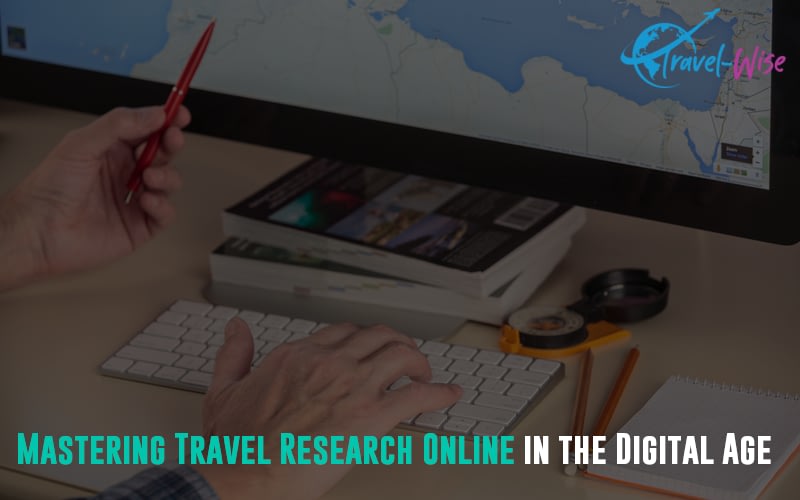
Travel research online is the key to unlocking amazing adventures in the digital age. It’s hard to find trustworthy travel info because there’s so much out there. We made this guide so you can confidently and easily research travel online. With our experience, we have visited many places, found simple solutions, and had unforgettable trips. Now, we want to share our insights and tips with you.
Also, check out our high-level overview of travel planning and creating an itinerary here . Also, note that Travel-Wise is built from the ground up to aid with travel planning, research , and community , and we truly hope it’ll inspire your next adventure. Travel-Wise now includes country travel guides that will help give you relevant links and information for good sources of information on a destination to help with your planning. Here is an example of preparing to travel to the United States.
Featured Photo 67852857 © Stanislav Moroz | Dreamstime.com
Government and official tourism agencies
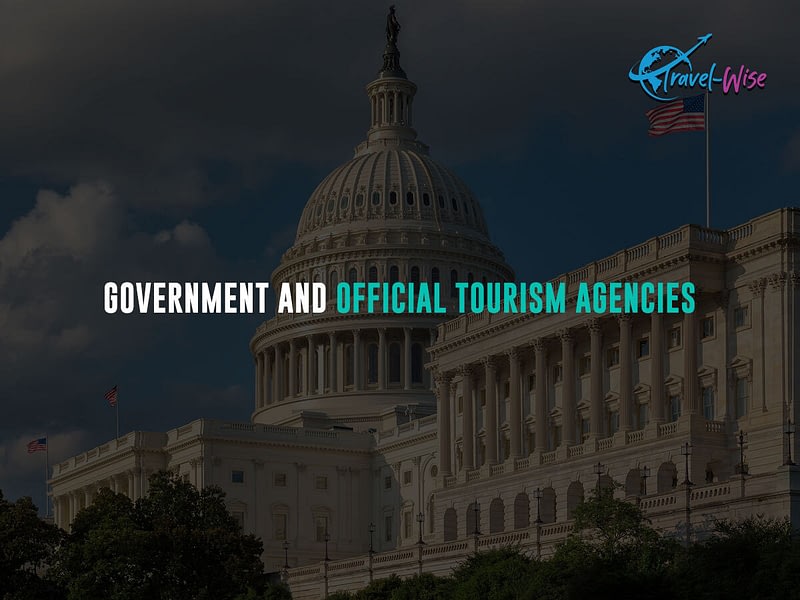
I suggest checking official government agencies that publish information for inbound travelers for trustworthy information. The information is always the most up-to-date (with limitations to world events). You’ll find stale and old information online, but government websites are the most reliable. That is why my first stop is the official websites when I look for information on safety concerns, visas for travel, laws, and regulations.
Best used for
- The current procedure, regulation, and costs of acquiring a visa and entering clearance.
- Some countries have current and up-to-date travel advisories around safety topics for travelers. This information, if available, is trustworthy.

Books are the most detailed source of information. They are full of diverse data and are often more than you need. The problem with books is that they can go stale within a few years. Of course, nations, nature, and people don’t change that fast, but details here and there go close.
Also, the book’s author may not align with your travel persona. This is important. They may not speak to or cover activities, topics, or points of interest that say to you. As a result, you may buy a book and end up feeling it didn’t cover some of the essential pieces you were looking for. Still, books used to be one of my staples.
We own a lot of Lonely Planet travel guides, Mountaineering, and scuba diving books to aid in our travels. Because it is challenging to publish a book, getting a book out enriches information. Books remain an excellent source of information with reliable ratings and recommendations.
- A starting point for consideration is if a recent (within the last 15 years) book covers the area comprehensively.
Travel agents

Travel Agents are professionals in the field who help you plan your travel. It is their job, and they often will have experienced everything they recommend to you. They can tell you about most of the activities in great detail. Because travel is centered on businesses, people, and agencies, travel agents specialize in specific areas of travel. Therefore, they know a lot about a particular place or style of travel. This experience is of great value for your travel planning. You may be interested in working with them to buy one of their packages and have all the planning done for you. The packages usually cost little or compete with your book rates due to affiliate deals with travel agencies.
The problem with travel agents comes back to your travel persona. They may not be a good match for your interests and, because of that, might prescribe you a trip they love. It might work better for you, though. Every travel agent is different, and some may be flexible in dealing with this. Being a good travel agent is a skill, and finding a good travel agent who works for you can be challenging.
Still, if you find a travel agent specializing in the place or type of travel you are interested in, you can count on good information. Nothing beats raw experience, and being able to ask your questions to someone directly can help prepare you much better than a book or other sources. If a package works for you, your planning gets automated as well! However, remember that these packages are struck through deals and are often more flexible than if you booked yourself.
- Pre-packaged deals or custom-made to help with travel planning.
- Knowledgeable travel expert that would be helpful to ask many important questions with.
- Professional and recent travel knowledge based on the agent’s expertise.
Leveraging social media for travel inspiration

Social media influences the travel industry, shaping consumers’ choices and preferences. The social aspect of travel creates a significant opportunity for brands to reach more people with engaging content. As new social platforms become more popular, brands need to interact with travelers on these platforms.
Social media as a source of inspiration
Social media is becoming a more in-demand source of travel inspiration, according to the 2023 Traveler Value Index . It shows that 35% of consumers use social media for travel ideas, which is more than travel agents (29%), media publications (26%), and entertainment (25%). Social media substantially influences younger generations, as half of the people under 40 use it for inspiration.
Generational impact
For consumers under 40, social media is almost as important as family (52%) for travel inspiration. Gen Z values social media even more, as 53% use it as their primary source. Brands must have a solid social media presence to reach younger travelers effectively.
Regional influence
The Impact of social media on inspiration varies by region. In South Africa, 59% of consumers seek inspiration from social media, and in Mexico, the figure is 54%. These regional variations underscore the global significance of social media’s role in travel inspiration.
Crafting effective social media campaigns
Creating innovative and engaging campaigns is the key to connecting with travelers on social media. Successful campaigns enable brands to reach a wider audience, stand out, and leave a lasting impression. Bite-sized content can significantly impact, as shown by examples like Destination Canada’s TikTok campaign and Abu Dhabi’s immersive experience.
Harnessing social media marketing for travel inspiration
Using social media solutions for travel marketing offers a direct channel to a targeted audience across brands like Expedia , Vrbo , and Hotels.com . These solutions encompass social integration packages, Instagram stories, co-branded videos, and custom promotions across multiple platforms. With the ever-increasing popularity of social media, ensuring a strong social strategy is imperative for success in inspiring and influencing travelers.
Folks who recently visited
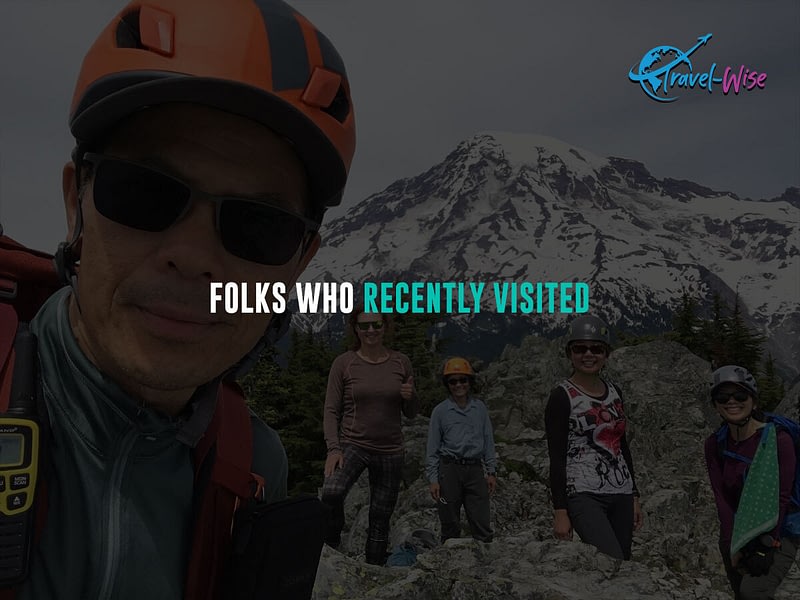
You’ll always hear of your co-workers, friends, and families traveling; sometimes, they’ve already gone to where you’ve been. Asking them for their suggestions of what to visit and a copy of their itinerary is an excellent way to give you a tremendous start in your travel plans! People love sharing; having someone trusted to ask detailed questions will help more than other sources.
Getting in touch with these trusted individuals could be challenging to schedule. I’ve often found that someone had much to suggest, but I couldn’t connect to jot all their info down. It is too much to ask most people to type it up for you, and if they have not already made a formal travel itinerary for sharing with you, the information is locked in their minds. Also, taking notes live from someone is a bit hit or miss for me. I feel like I always forget about something important someone told me about. Also, your travel persona may not match yours, leaving gaps in what you want to experience from your itinerary.
- The trusted source of information from their experience with surprisingly strong detail and tips will be helpful. In addition, since they know you, they can custom-tailor the information for you and tell you what you want to hear.
- When you have tough questions and need answers from someone who has been there.
Travel blogs
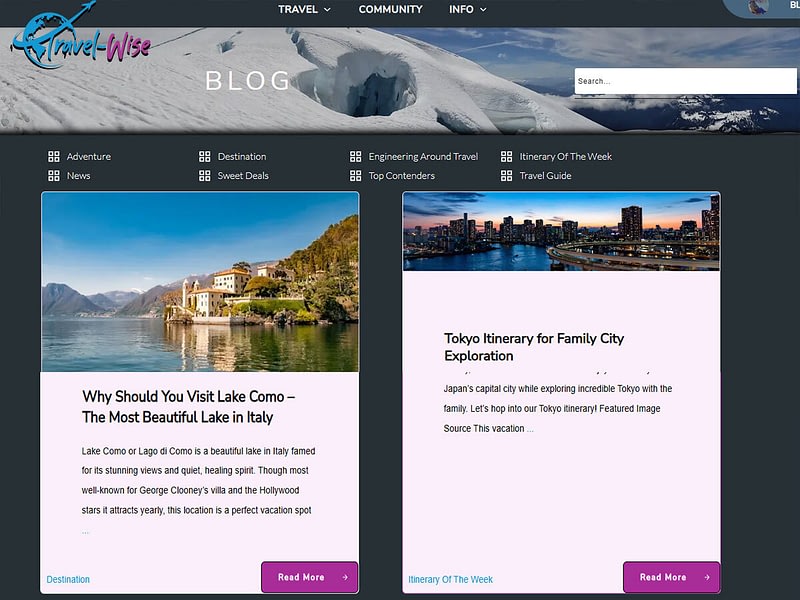
Travel blogs are popping up around the internet and target specific niches. Similar to what I mentioned, travel agents focus on specialization. Travel blogs are very similar. They focus on luring a specific traveler and use precise keywords to show up on search engines. Travel blogs provide genuine information identical to books. You can contact the travel bloggers live and ask questions of them. Travel bloggers offer trip packages with affiliate deals that have similar costs to self-booking.
The problem with travel blogs is that they are like books. They could go stale. However, I see some dedicated bloggers making sure they update their information. However, quality over time can differ between bloggers. The blog websites are more flexible than books as any update to the data can be live within minutes versus republishing and buying a new book. You can also hand-choose what areas interest you most in what to read.
Travel bloggers sometimes speak to your travel persona directly, leaving you with some holes to fill in on other websites. However, travel blogs are still excellent sources and relatively quick and free to search on your favorite search engine. In addition, they can be excellent sources of community and information and help validate the information from other sources.
- Travel Bloggers often have pre-packed deals, too. If they match your travel persona, this can help with your planning.
- They have a wealth of detailed information about their travel niche that can be as detailed as the books.
Why travel news and alerts matter

In the dynamic world of travel, staying well-informed
A proactive approach to ensure your exciting and secure adventures begins with keeping up with travel news and alerts. As you traverse the globe, staying updated on the latest developments empowers you to make informed decisions. Some of the travel news websites are given below.
- Travel Weekly : Travel Weekly, owned by the prominent travel media conglomerate Northstar Travel Group, delivers up-to-the-minute breaking news, destination insights, hotel updates, cruise schedules, travel trends, and valuable content catering to the business-to-business sector of the tourism industry.
- PhocusWire : PhocusWire is a website focusing on technology, distribution, and the digital economy for travel, tourism, and hospitality. It belongs to Phocuswright, a global authority in travel research and analysis.
- BBC Tourism is a part of BBC News, a trusted source of global news. It features tourism news, travel guides, videos, photos, quizzes, and blogs from worldwide destinations. It helps you discover new locations and cultures with BBC’s quality journalism.
Safety measures for travelers
To stay secure while moving, travelers should remain vigilant and take proactive steps. Research the local customs and laws of your destination, register with your embassy if necessary, and stay connected with news sources and official government travel advisories. Utilize travel research online resources to access up-to-date information and practical tips to enhance your safety during your journey.
Create a tailored adventure
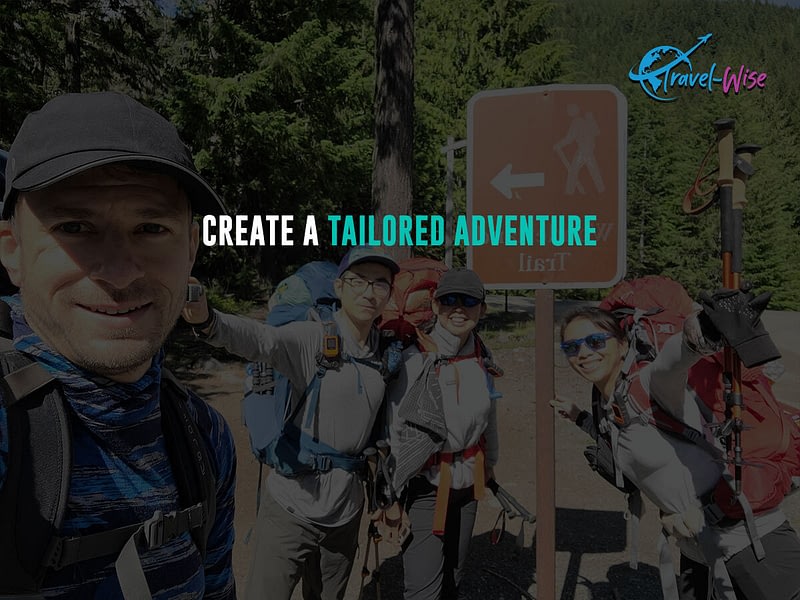
In modern travel, the power to curate your journey lies at your fingertips. “Customize Your Travel Preferences” isn’t just a phrase; it’s an invitation to embark on a personalized travel experience that caters to your unique desires. This process involves more than selecting destinations–crafting a travel plan that resonates with your soul.
What are travel preferences?
Travel preferences encompass the myriad choices that make a journey uniquely yours. The places you like to go, how you get there, where you stay, and what you create your adventure. Understanding and fine-tuning these preferences allows you to transform a mere trip into an unforgettable voyage. This article will help you understand your travel persona if you don’t already know it.
Crafting your travel plan
Writing a travel plan isn’t just about listing places to visit; it’s about creating a roadmap that aligns with your aspirations. Consider your desired experiences – travel excitement, cultural involvement, or leisure. Then, interweave these aspirations into a seamless itinerary. With Travel-Wise, every trip detail is tailored to your preferences and dreams. Plan your trip with our trip planner , and make it unforgettable.
Broadening horizons through travel
Traveling isn’t just about changing locations; it’s about shifting perspectives. It’s an opportunity to immerse yourself in diverse cultures, savor new cuisines, and engage with different ways of life. Trying new things can make you grow and appreciate different experiences.
Choosing the right destination
Selecting a destination can be exhilarating yet challenging. The allure of historical sites, pristine beaches, bustling cities, and tranquil retreats beckons from every corner of the globe. It’s essential to align your chosen destination with your interests. Your journey depends on what you like – history, nature, or cities. It’s easy to plan your trip when we have country guides to help you guide about everything about the country.
Exploring your travel options
Travel manifests in many forms – solo adventures, romantic getaways, family escapades, and group expeditions. The best form of travel is the one that resonates with you, capturing the essence of your desired experience. Whether it’s a backpacking adventure, a luxurious cruise, a road trip, or a train journey, your choice defines the flavor of your expedition.
Embrace the world of travel research online to unlock a treasure trove of information, insights, and options. Travel-Wise is a useful tool for creating your adventure. Customize your travel preferences and let the world unfold harmoniously with your desires.
Discover new horizons with Travel-Wise
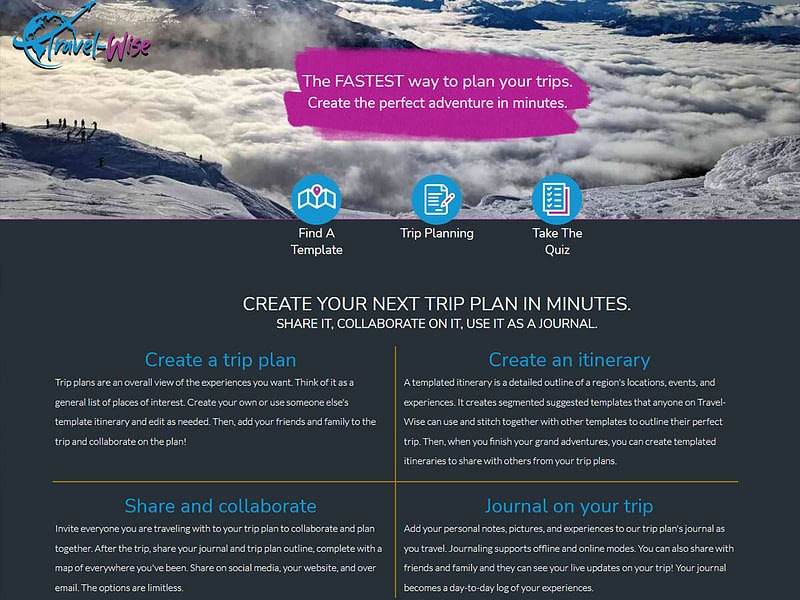
Embarking on discovery journeys becomes effortless with innovative tools offered by Travel-Wise, your all-in-one travel companion. Travel-wise, it serves as your guide, enhancing every step of your adventure as you explore the world. Let’s explore how this tool transforms your travel experience and enhances your explorations.
Seamless travel planning
Travel-Wise simplifies travel planning by providing a comprehensive platform where you can design your journey . Our tool simplifies trip planning , saves time, and helps you make the most of your adventure.
Personalized recommendations
Tailoring your travels to your preferences is at the core of Travel-Wise. The tool leverages advanced algorithms to offer personalized recommendations that align with your interests. Our platform recommends activities and destinations that match your interests, whether you love nature, history, or food.
Interactive mapping
Navigate unfamiliar terrain with confidence using our interactive maps. Discover points of interest, local gems, and recommended routes, all accessible at your fingertips. The mapping feature guides you and adds an element of adventure to your journey.
Community engagement
Join a community of explorers on Travel-Wise to gain insights and share experiences. Engaging with like-minded individuals enriches your travels and opens up new horizons for discovery.
Local insights
Experience your destination like a local with insider tips and recommendations. Travel-Wise shows you unique and real experiences using the knowledge of locals and experienced travelers.
As you embrace the world of travel research online, Travel-Wise stands as your trusted ally, enhancing your journeys with its features. Create unforgettable memories of community and travel planning.
Did you know Travel-Wise is a free trip-planning tool to help you make your next trip plans a breeze?
June 26, 2023
How To Find Other Travelers As A Solo Traveler
May 22, 2023
How To Behave While On Travel
May 8, 2023
The Beauty Of The Life Of An Adventurer
- Skift Research
- Airline Weekly
- Skift Meetings
- Daily Lodging Report
New Research
Just published.

Consumer Habits
Regenerative Tourism: Feedback Report
October 2024
Regenerative tourism represents an opportunity for the industry to respond to clear market demand and develop new approaches to sustainability and innovative business models. But it suffers from a lack of defined methodologies and demonstrable impact.
Latest Reports
The woman traveler: key data and insights.

U.S. Travel Trends Q2 2024: Insights into Family Travel

Skift Travel Health Index
Skift travel health index: august 2024 highlights.
September 2024

Online Travel
Direct Bookings vs. OTAs: Analyzing the Shift in U.S. Travel Booking Trends

Get More From Your Skift Research Subscription
Ask Skift – powered by both Skift insights and artificial intelligence – gives readers deeper insights into the business of travel. Ask Skift is built on more than a decade of Skift’s original reporting, proprietary research, and industry-leading events – as well as public financial information. Its answers are providing the next level of travel industry insights for professionals around the world.
Most Read This Month

Exploring Gen Z and Millennial Travel Habits
Millennials and Gen Z are steering travel trends with a focus on technology, sustainability, and a quest for distinctive and meaningful experiences.

Direct bookings are surging, reshaping competition and requiring both OTAs and suppliers to precisely target and understand traveler preferences.

Carbon Offsets: Fact from Fiction
Carbon offsets exist within a flawed ecosystem but with the current challenges of decarbonizing the aviation industry, they should not be disregarded as an interim measure in the journey towards decarbonization. It is incumbent on the industry themselves to reform a broken system.
Skift Research and McKinsey & Co.
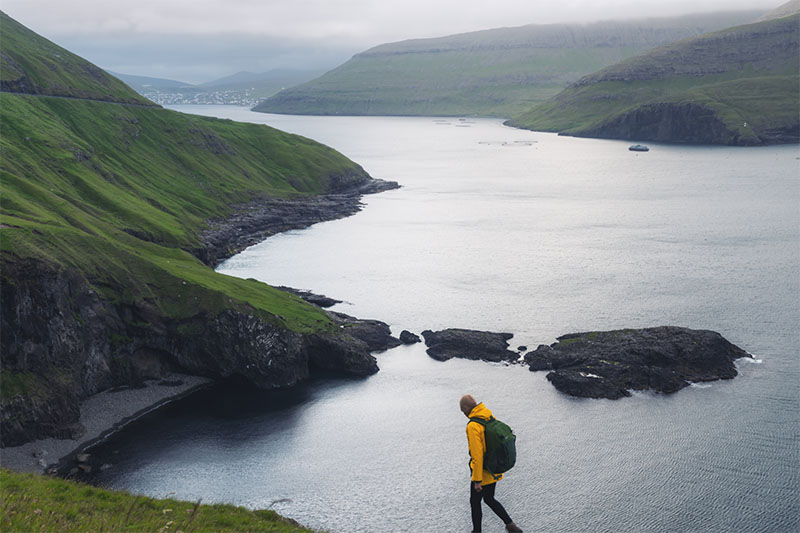
The Evolving Role of Experiences in Travel
This new report, created in collaboration between Skift and McKinsey , examines the world of travel experience—ranging from stadium rock concerts to guided nature hikes to in-home culinary gatherings and everything in between. The report offers an assessment of the experience industry as it stands today, presents ideas that could help address current dissatisfactions, and looks at opportunities for various players to capitalize on growing interest.
Skift Travel 200 Index
The Skift Travel 200 combines the financial performance of nearly 200 travel companies worth more than a trillion dollars into a single number. The ST200 makes it easy to track travel industry performance for the first time ever.
Learn more about the ST200 by reading our full methodology .
View by Sector
- Accommodations
- Travel Tech
- Cruise and Tours
- Ground Transport
August 2024 Highlights

Find out how the travel industry is performing across the globe.
Skift Research in Action
Skift Research analysts contribute to a wide range of in-person and online events. Watch clips from the recent Skift Global Forum, held in New York City in September 2024.
Subscribe to Skift Research
- 3+ new reports per month
- Access to 200+ reports
- Analyst Q&As through email
- 25% off tickets to Skift Forum events
- Quarterly analyst report review calls
- High resolution PDFs of new reports as they're released
An official website of the United States government
The .gov means it’s official. Federal government websites often end in .gov or .mil. Before sharing sensitive information, make sure you’re on a federal government site.
The site is secure. The https:// ensures that you are connecting to the official website and that any information you provide is encrypted and transmitted securely.
- Publications
- Account settings
The PMC website is updating on October 15, 2024. Learn More or Try it out now .
- Advanced Search
- Journal List
- Int J Environ Res Public Health

Medical, Health and Wellness Tourism Research—A Review of the Literature (1970–2020) and Research Agenda
1 Institute for Big Data Research in Tourism, School of Tourism Sciences, Beijing International Studies University, Chaoyang District, Beijing 100024, China; nc.ude.usib@anilgnohz (L.Z.); moc.361@5220niloabgned (B.D.); moc.361@gnay__uyil (L.Y.)
Baolin Deng
Alastair m. morrison.
2 Greenwich Business School, Old Royal Naval College, University of Greenwich, London SE10 9SL, UK; [email protected]
J. Andres Coca-Stefaniak
Associated data.
Data are reported in the article.
Medical, health and wellness tourism and travel represent a dynamic and rapidly growing multi-disciplinary economic activity and field of knowledge. This research responds to earlier calls to integrate research on travel medicine and tourism. It critically reviews the literature published on these topics over a 50-year period (1970 to 2020) using CiteSpace software. Some 802 articles were gathered and analyzed from major databases including the Web of Science and Scopus. Markets (demand and behavior), destinations (development and promotion), and development environments (policies and impacts) emerged as the main three research themes in medical-health-wellness tourism. Medical-health-wellness tourism will integrate with other care sectors and become more embedded in policy-making related to sustainable development, especially with regards to quality of life initiatives. A future research agenda for medical-health-tourism is discussed.
1. Introduction
In 1841, Thomas Cook organized a tour of 570 people to travel from Leicester to Loughborough’s hot springs [ 1 ]. This was the first historically documented tour arranged by a travel agent. However, far earlier, people in Ancient Greece used to travel considerable distances for medical treatment [ 2 ]. Thus, the pursuit of health and medical care has been an essential reason for travel for centuries.
Today, people continue to travel in the pursuit of relaxation, for health reasons, as well as fitness and well-being [ 3 ]. As a response to this growing demand, countries, medical providers, and hospitality and tourism organizations are adapting to offer a broader set of medical, health, and wellness tourism experiences.
The concept of medical-health-wellness tourism has emerged relatively recently as a scholarly field of enquiry in tourism [ 4 , 5 , 6 ]. Although it has been pointed out that travel medicine has existed for 25 years [ 7 ], much of the research related to this has traditionally focused on medical aspects with inadequate consideration given to travel or tourism. Medical-health-wellness tourism can be classified into two primary categories according to a tourist’s choice - obligatory or elective. Obligatory travel occurs when required treatments are unavailable or illegal in the place of origin of the traveler and, as a result of this, it becomes necessary to travel elsewhere to access these services. Elective travel is usually scheduled when the time and costs are most suitable, and the treatments may even be available in the travelers’ home regions [ 8 ]. Other studies have classified these forms of travel and tourism into specific types based on the purpose of the treatment, such as dental tourism [ 9 ], stem cell tourism [ 10 ], spa tourism [ 11 ], springs tourism [ 12 ], IVF treatment [ 13 ], hip and knee replacements, ophthalmologic procedures, cosmetic surgery [ 5 ], cardiac care, and organ transplants [ 14 ].
A consensus is yet to be established on the definitions and contents of medical-health-wellness tourism, and how they interact, including their potential overlaps. Medical travel and tourism, health tourism, wellness tourism, and other similar terms (e.g., birth tourism, cosmetic surgery tourism, dental tourism) tend to be investigated separately in tourism research [ 15 , 16 , 17 , 18 , 19 , 20 ]. Notwithstanding the apparently disconnected nature of published research in this field, medical-health-wellness tourism has become much more popular for a variety of economic, cultural, lifestyle and leisure reasons [ 11 , 21 , 22 ]. Given their rapid development, it seems appropriate to conduct a comprehensive review of the definitions, history, typologies, driving factors, and future directions for these forms of tourism.
This study firstly reviews existing scholarly research through a meta-analysis of medical-health-wellness publications in the context of tourism ( Section 2 ). Then, the method used to analyze the data collected from ISI Web of Science is outlined in Section 3 , followed by a discussion of the research findings ( Section 4 ). Finally, in Section 5 , the conclusions, future research directions, and limitations of the study are presented.
2. Scholarly Reviews and Meta-Analyses of Medical, Health and Wellness Tourism
Previous reviews of the literature and meta-analyses have contributed to clarifying the overall understanding of medical-health-wellness tourism. Existing literature reviews tend to be very broad, spanning health-oriented tourism, medical tourism, sport and fitness tourism, adventure tourism, well-being (Yang sheng in Chinese) tourism, cosmetic surgery tourism, spa tourism, and more.
Medical tourism is an expanding global phenomenon [ 15 , 23 , 24 ]. Driven by high healthcare costs, long patient waiting lists, or a lack of access to new therapies in some countries, many medical tourists (mainly from the United States, Canada, and Western Europe) often seek access to care in Asia, Central and Southern Europe, and Latin America [ 25 , 26 , 27 ]. There are potential biosecurity and nosocomial risks associated with international medical tourism [ 28 ]. One research study collected 133 electronic copies of Australian television programs (66 items) and newspapers (65) about medical care overseas from 2005 to 2011 [ 29 ]. By analyzing these stories, the researchers discovered that Australian media coverage of medical tourism was focused geographically mainly on Asia, featuring cosmetic surgery procedures and therapies generally not available in Australia. However, people tend to engage with medical tourism for a broad range of reasons. In some cases, it is better service quality or lower treatment costs that prevail. In other cases, treatments may not be available locally, or there are long patient waiting lists for non-emergency medical care. Some 100 selected articles were reviewed and categorized into different types of medical tourism depending on the medical treatments they involved, such as dentistry, cosmetic surgery, or fertility work [ 25 ]. An analysis was done on 252 articles on medical tourism posted on the websites of the Korean Tourism Organization and the Korean International Medical Association [ 30 ]. This work enhanced the understanding of medical tourism in Korea as well as identifying the key developmental characteristics. Another research study detailed patient experiences in medical travel, including decision making, motivations, risks, and first-hand accounts [ 31 ]. A literature review was conducted on international travel for cosmetic surgery tourism [ 5 ] and it concluded that the medical travel literature suffered from a lack of focus on the non-surgery-related morbidity of these tourists.
Another set of authors defined health tourism as a branch of tourism in general in which people aim to receive specific treatments or seek an enhancement to their mental, physical, or spiritual well-being [ 32 ]. This systematic literature review assessed the value of destinations’ natural resources and related activities for health tourism. It was argued that most of the research on health tourism has focused on travel from developed to developing countries, and that there is a need to study travel between developed nations [ 33 ].
Wellness tourism is a key area of relevant research as well [ 34 ]. One research study reviewed trends in wellness tourism research and concluded that tourism marketing had so far failed to tap into the deeper meaning of wellness as a concept [ 35 ]. The emergence of health and wellness tourism was explored with their associated social, political, and economic influences [ 13 ]. A review was conducted of the development of wellness tourism using the concept of holistic wellness tourism where it was found that the positive impacts of this type of tourism on social and economic well-being were key to its rising levels of popularity [ 36 ].
All in all, although earlier literature reviews provide invaluable insights into medical-health-wellness tourism, there is a lack of studies that approach this concept in a holistic way. This research seeks to redress this balance by delivering a holistic review of the literature with the following objectives in mind: (1) investigating international journal articles across the typologies of tourism outlined above; (2) identifying influential scholars that have significantly contributed to this field; and (3) summarizing key trends in markets, industry development and promotion, as well as policy-making and impacts. In order to achieve this, a systematic review was conducted to analyze research articles in medical-health-wellness tourism published over a 50-year period from 1970 to 2020.
3.1. Data Collection
A two-step approach was adopted for the development of a database of publications for analysis with CiteSpace. The first step involved a search for relevant, high-quality refereed articles in medical-health-wellness tourism. Several academic journal databases, within tourism and hospitality but also including other disciplines too, were searched for relevant articles in medical-health-wellness tourism using a set of selected keywords. The ISI Web of Science and Scopus were chosen for this purpose as a result of their international recognition and comprehensiveness. Articles included in the list of references of selected articles were also considered valid as part of this search, in line with methodological suggestions for systematic literature searches [ 37 ]. Cited articles were also collected from prominent journals, including the Southern Medical Journal, Journal of Travel Medicine, BMC Public Health, Annals of Tourism Research, Tourism Management, Journal of Travel Research, and Journal of Vacation Marketing. Non-tourism related journals were selected as well including Amfiteatru Economic, Asia Pacific Viewpoint, Public Personal Management, and Revista de Historia Industrial. Adding these references not only delivered a higher number of relevant articles to the database, but it also increased its representativeness.
The second step involved using appropriate, valid and representative search keywords. A total of 986 articles were gathered using the following keywords: medical tourism, health tourism, wellness tourism, and spa tourism. After careful sorting of these publications, using their abstracts and keywords, the number of articles in the database was narrowed down to 802. Of these, 615 were obtained using the keywords medical tourism or wellness tourism, 157 were located by searching for health tourism, and 30 were discovered using spa tourism as the search term. Using the above keywords and restricting the search to 50 years (1970–2020), the first article was found to be published in 1974. As a result, the ensuing analysis of the literature comprises the period from 1974 to 2020.
3.2. Data Analysis
The research tool used for this study was CiteSpace, which is a bibliometric analysis software developed by Professor Chaomei Chen of Drexel University based on the Java framework [ 38 ]. This software assists researchers in the analysis of research trends in a specific field of knowledge and presents scientific knowledge structures through visualization. It has been applied to numerous research fields by scholars from many countries. The data processing for this research used the software V.5.7.R2 (64-bit) version.
The data were classified and analyzed to achieve three specific goals. The first and primary goal of this review work was to analyze the content of the chosen articles, including year of publication, authors, journal impact factors, and the institutional affiliations of scholars in this field. The data were then sorted into categories. The order of authorship was not recorded. For multiple-authored articles, each author was given the same level of credit as sole authors. Second, one of the aims of this research was to discover associations in authorships, regions, and affiliations using statistical analysis. Third, the 802 articles were classified into dominant thematic categories applying the approach proposed by Miles and Huberman [ 39 ]. Three flows of analytical activities were targeted here: data reduction, data display, and verification of data. In the data reduction activity, the word count technique was adopted. Through content analysis, each article’s title and full-text body were recorded for word counting. The most frequently appearing words were extracted to represent the main topics of the collected articles. The dominant thematic categories to be explored further based on the content analysis and word count were: (1) tourism market: tourist demand and behavior; (2) tourism destinations: development and promotion; and (3) tourism development contexts: policies and impacts.
Finally, in order to refine the set of topic sub-categories, abstracts, first paragraphs, and conclusions were read to make the most appropriate assignments. This approach contributed to the more advanced stages of development of the classification of sub-categories and, consequently, the verification of findings.
This section presents the results of the data analysis carried out in this study and provides further insights on the methodology adopted.
4.1. Overview of Articles Published
The 802 articles selected were all published in English and in international peer-reviewed academic journals. Figure 1 displays the timeline distribution of the research on medical-health-wellness tourism and shows a steady growth in publications in this field between 1974 and 2020. This growth in scholarly activity is particularly significant from 2010 onwards. In fact, 74.9% of the articles were published between 2013 and 2020.

Number of articles by publication year.
4.2. Source Journals
Initially, the first stage of this literature search involved identifying academic journals publishing research articles on medical-health-wellness tourism. It was found that 38 articles had been published on this topic in Tourism Management, and 24 articles in Social Science & Medicine. Table 1 shows the top ten tourism journals for publications in this field, with Tourism Management in first place.
Tourism journals publishing articles on medical-health-wellness tourism.
Non-tourism journals in fields such as business, economics, and health, also contributed a significant number of publications in this field, as shown in Table 2 .
Non-tourism journals publishing articles on medical-health-wellness tourism.
4.3. Author Productivity and Authorship Analysis
The second aim was to identify the most prolific scholars in medical-health-wellness tourism research. This was achieved using co-occurrence network analysis of the authors of relevant research articles ( Figure 2 ). Each node in the co-occurrence map shown in Figure 2 represents a given scholar. The larger the node, the more articles the authors published on the topic, with the connections between nodes representing cooperation between authors.

Author article productivity.
Among the 2381 authors identified, 1820 (76.4%) contributed to only one article, whereas the remaining 561 (23.6%) authored two or more articles. The three most prolific authors were Jeremy Snyder, Valorie Crooks, and Rory Johnston.
4.4. Author Regions and Affiliations
Another objective was to illustrate the relationships and networks of authors publishing research on medical-health-wellness tourism. An analysis of countries this research originated from was carried out using the CiteSpace software. Figure 3 shows that scholars publishing in this field were distributed across 61 countries. The largest group of authors originated from the USA ( n =197). The second and third largest groups corresponded to Canada ( n = 88) and the UK ( n = 84), respectively, followed by Australia ( n = 70) and South Korea ( n = 65). As shown in Figure 3 , authors from the USA and Canada have made the most significant contributions to medical-health-wellness tourism based on the number of journal articles published.

Country of origin of authors in medical-health-wellness tourism.
As shown in Figure 4 , a significant number of scholars publishing in this field ( n = 47) were affiliated to Simon Fraser University in Canada. This university was followed by Sejong University in South Korea ( n = 13), and the London School of Hygiene & Tropical Medicine ( n = 13) in the UK. The top universities in terms of author frequency were based in Canada, USA, Australia, UK, South Korea, and Hong Kong.

Institutions of authors.
4.5. Thematic Analysis of Research
The fourth research objective was to elicit the prevailing research themes using the 802 articles gathered. First, an analysis of keyword frequency was performed to identify the main research interests. High frequency keywords reflect the research ‘hotspots’ in the field. Using CiteSpace’s keyword visualization analysis function, the keyword co-occurrence knowledge map of medical-health-wellness tourism research was drawn to grasp the research ‘hotspots’ ( Figure 5 ).

Frequencies of research keywords.
Then, content analysis performed on the articles gathered for this study identified three main themes, namely: markets (tourist demand and behavior), destinations (development and promotion), and development environments (policies and impacts). An uneven distribution of research themes is highlighted in Figure 6 and Figure 7 .

Timeline of research keyword appearance.

Themes of research articles.
4.6. Markets: Demand and Behavior
Previous studies have shown that the growth of medical-health-wellness tourism in developing countries is largely linked to lower costs, shorter patient waiting lists, and better quality of care [ 40 ]. Similarly, it is suggested that the inequalities and failures in domestic health care systems often lead to people seeking treatment to travel abroad to obtain it [ 41 ]. In general terms, higher costs, long patient waiting lists, the relative affordability of international air travel, favorable exchange rates, and the availability of well-qualified doctors and medical staff in developing countries, all contribute to this situation [ 42 ].
As the demand for these forms of tourism has risen over time, processes and factors influencing decision-making have attracted growing levels of scholarly enquiry. For example, a political responsibility model was used to develop a decision-making process for individual medical tourists [ 43 ]. A sequential decision-making process has been proposed, including considerations of the required treatments, location of treatment, and quality and safety issues attendant to seeking care [ 44 ]. Accordingly, it has been found that health information and the current regulatory environment tend to affect the availability of medical care.
Multiple factors may simultaneously influence decisions related to the destination for care, including culture [ 45 ], social norms [ 46 ], religious factors [ 47 ], and the institutional environment [ 48 ]. It is suggested that socioeconomic conditions shape medical travelers’ decision-making and spending behavior relative to treatment, accommodation, and transport choices as well as the length of stay [ 49 ]. Perceived value is a key predictor of tourist intentions. More specifically, perceived medical quality, service quality, and enjoyment significantly influence the intention to travel abroad for medical-health-wellness purposes [ 50 ]. Further, perceived quality, satisfaction, and trust in the staff and clinics have significant associations affecting intentions to revisit clinics and the destination country [ 51 ]. An empirical study was conducted and found that physical convenience in willingness to stay and time and effort savings in perceived price were key factors affecting the decision-making related to medical hotels [ 52 ]. In addition, the level of perceived advantages, price perceptions, and willingness to stay were found to differ significantly between first-time patients and those with two or more previous visits. In addition, it was found that community communication was a major factor influencing decision-making. For instance, it is argued that virtual community membership has a strong influence on tourist behaviors and the way information is transmitted [ 53 ].
Compared to other tourists, the mental activity and behavior of medical-health-wellness travelers are quite different. Medical tourists are less likely to question their need for surgery and tend to be much readier to accept it [ 54 ]. The emotion and anxiety conditions of medical tourists differ from others’ experiences of travel and tourism, as well as their giving and receiving of transnational health care [ 55 ]. It has been found that language barriers and parenting responsibilities can be significant challenges, while hospital staff and their own families are often major sources of support for medical tourists [ 56 ]. Furthermore, there are significant differences among visitors from different countries in terms of choices, discomfort, preferred product items, and attitudes towards medical tourism [ 57 , 58 ].
4.7. Destinations: Development and Promotion
In response to the demands of medical-health-wellness tourism, destination development and promotion are attracting growing levels of scholarly interest. Scholars from different countries have discussed the market status of Turkey [ 12 , 59 ], the Caribbean [ 60 ] and Barbados [ 61 ], India [ 62 , 63 ], Canada [ 64 ], and Albania [ 65 ]. Table 3 outlines the most frequently researched country destinations in this respect.
Medical-health-wellness destination frequency in keywords.
The advantages and disadvantages of Turkey were examined and indicated needs for improvements [ 59 ]. In another research study, three years (2005, 2007, and 2011) of actual and projected operational cost data were evaluated for three countries: USA, India, and Thailand [ 66 ]. This study discussed some of the inefficiencies in the U.S. healthcare system, drew attention to informing uninsured or underinsured medical tourists of the benefits and risks, and determined the managerial and cost implications of various surgical procedures in the global healthcare system.
As regards medical-health-wellness tourism destination development, scholars have explored research from various perspectives. Conceptual frameworks have been developed to include tourism destinations and services in the context of medical and health tourism [ 59 , 67 ]. Advice has been provided from the perspective of public and private hospital doctors [ 68 ]. The principles of designing hospital hotels have been proposed, including proper planning, low prices of tourism services, medical education, creating websites on medical tourism, and health tourism policy councils [ 69 ]. Above all, scholars have posited that meeting or exceeding tourist expectations and requirements should remain the top priorities as regards the effective development of medical tourism destinations [ 69 , 70 ].
Once a medical-health-wellness tourism destination is developed successfully, marketing and promotion are essential to attract tourists. As part of this process, informing potential patients about procedural options, treatment facilities, tourism opportunities, and travel arrangements are the keys to success [ 71 ]. Most tourists rely on the Internet to gather information about destinations, often using mobile devices or personal computers [ 72 ], with websites and social media playing a key role in this respect, and specifically with regards to information about destinations’ medical facilities, staff expertise, services, treatments, equipment, and successful cases [ 73 ]. For example, apps for medical travel are available to attract tourists and promote medical tourism in Taiwan [ 74 ].
Numerous businesses promote medical-health-wellness travel, including medical travel companies, health insurance companies, travel agencies, medical clinics, and hospitals [ 75 ]. Among them, medical travel facilitators play a significant role as engagement moderators between prospective patients in one country and medical facilities elsewhere around the world [ 76 ]. The services offered on medical tourism facilitator websites vary considerably from one country to another [ 77 ]. Although medical travel facilitators operate on a variety of different scales and market their services differently, they all emphasize the consumer experience through advertising quality assurance and logistical support [ 78 ].
Scholarly research has also considered the factors that need to be taken into consideration in medical-health-wellness tourism promotion. This research has suggested that destinations should identify the specifics in their health tourism resources, attractions, and products, seek collaboration with others, and build a common regional brand [ 79 ]. Regional differences should be considered in the process of marketing as medical-health-wellness tourism is a global industry [ 77 ]. International advertisers need to understand the important, contemporary, and cultural characteristics of target customers before promotion [ 80 ]. Similarly, destinations need to portray safe and advanced treatment facilities to dispel potential patient worries and suspicions. Messages related solely to low cost may detract from and even undermine messages about quality [ 71 ]. However, while benefits are highly emphasized online, websites may fail to report any procedural, postoperative, or legal concerns and risks associated with medical tourism [ 81 ].
4.8. Development Environments: Policies and Impacts
The rise of medical-health-wellness tourism emphasizes the privatization of healthcare, an increasing dependence on technology, and the accelerating globalization of healthcare and tourism [ 82 ]. There are challenges and opportunities in the development of these tourism forms. For instance, it has been suggested that medical tourism distorts national health care systems, and raises critical national economic, ethical, and social questions [ 83 ]. Along with the development of medical-health-wellness tourism, social-cultural contradictions [ 84 ] and economic inequities are widening in terms of access, cost, and quality of healthcare [ 85 ]. It is argued that this tourism leads destinations to emphasize tertiary care for foreigners at the expense of basic healthcare for their citizens [ 86 ]. Moreover, in some instances, this phenomenon can exacerbate the medical brain drain from the public sector to the private sector [ 43 , 87 , 88 ], leading to rising private health care and health insurance costs [ 88 ].
While medical-health-wellness tourism is a potential source of revenue, it also brings a certain level of risk to destinations and tourists [ 89 ]. The spread of this type of tourism has been posited as a contributing factor to the spread of infectious diseases and public health crises [ 90 , 91 ]. Medical tourists are at risk of hospital-associated and procedure-related infections as well as diseases endemic to the countries where the service is provided [ 92 ]. Similarly, the safety of some treatments offered has also been the subject of growing levels of scrutiny. Contemporary scholarship examining clinical outcomes in medical travel for cosmetic surgery has identified cases in which patients traveled abroad for medical procedures and subsequently returned home with infections and other surgical complications [ 93 ]. Stem cell tourism has been criticized on the grounds of consumer fraud, blatant lack of scientific justification, and patient safety [ 94 , 95 ]. During the process of medical tourism, inadequate communication, and information asymmetry in cross-cultural communication may bring medical risks [ 96 ].
Medical-health-wellness tourism has emerged as a global healthcare phenomenon. Policy guidance is vital for the development of this sector in the future [ 97 ]. There are policy implications for the planning and development of medical-health-wellness tourism destinations [ 98 ]. Generally, it has been found that the medical-health-wellness tourism sector tends to perform better in countries with a clear policy framework for this activity [ 99 ]. Similarly, scholars have argued the need for a clearer policy framework regulating tourism agencies and the information and services they provide [ 100 ]. The upsurge of these tourism forms presents new opportunities and challenges for policy makers in the health sector. It has been argued that existing policy processes are mainly based on entrenched ideological positions and more attention should be paid to robust evidence of impact [ 101 ]. The UK developed policies focused on ’patient choice’ that allow people who are able and willing to choose to travel further for healthcare [ 102 ]. However, more robust policy making is still required to strengthen national health services and facilitate medical-health-wellness tourism sector development in destinations [ 103 , 104 ].
5. Discussion and Conclusions
5.1. generation discussion.
This study is based on a literature review of 802 articles on medical-health-wellness tourism from 1970 to 2020. Jeremy Snyder was found to be the most prolific author in this field with 45 articles. It has been found that the literature on this topic can be summarized into three themes: markets (tourist demand and behavior), destinations (development and promotion), and development environments (policies and impacts). The scholarly research in this growing field has undergone a shift in emphasis from tourist demand and behavior to the promotion and development of destinations, and, more recently, to policies and impacts.
To attract more tourists, destinations should explore their potential for medical-health-wellness tourism. Accessibility, procedural options, treatment facilities, travel arrangements, safety guarantees, and government policies remain influential factors. In the development and promotion of this form of tourism, childhood vaccinations, oral health, legal frameworks, evaluation systems, entrance systems, and macro-policy continue to be areas of concern and where further research is required. Above all, meeting or exceeding tourist expectations and requirements is the most important consideration to promote medical-health-wellness tourism. Similarly, appropriate policy guidelines and frameworks are necessary to support this form of tourism. Importantly, medical-health-wellness tourism may result in negative impacts on the healthcare service provision for local residents in poorer countries, with tourists from richer countries benefiting to the detriment of local communities. However, if managed successfully, this form of tourism can also be a force for good in terms of fostering the economic development of countries delivering these services.
The results indicated that the research literature is spread across a range of different disciplines and there is not one single venue for publishing in this field. A better integration of the research and improved understanding of the overlaps among medical, health, and wellness tourism is required.
5.2. Future Research Trends
5.2.1. industrial perspective.
Medical-health-wellness tourism will, over time, integrate fully with other healthcare and wellness services. Similarly, medical challenges such as disease prevention and traditional medicine remain essential directions for the future of health tourism. This form of tourism will also integrate further with industries such as wellness culinary tourism, mindfulness tourism, active tourism (including adventure tourism), and even cosmetic surgery tourism, leading to a vast array of potential research avenues linked to health tourism destinations. These futures will greatly promote the physical and mental health of wellness tourists. This is another emerging direction for future medical-health-wellness tourism research.
5.2.2. Destination Development Perspectives
Medical-health-wellness tourism will become more significant forms of tourism and impact the development of different nations and areas. For example, this tourism will integrate with Chinese traditional culture. Traditional treatments and remedies will become more of an advantage and should be a topic for future medical-health-wellness tourism research, as well as in other countries with unique health cultures, treatments, and procedures.
Thailand, Malaysia, and other Southeast Asian countries are favored by tourists from developed countries due to lower costs. In the future, these areas need to focus more on tourism product design, health tourism marketing, community participation, and cross-cultural communication. Developed countries such as the USA, Japan, and South Korea, will use advanced technology and medical equipment to take the path to high-end, high value-added tourism development. This will lead to some new research opportunities.
5.2.3. Tourist Perspectives
Compared with other types of tourists, the needs of medical-health-wellness tourists will receive more attention. Based on previous research, the psychology and perceived value of these tourists are the focus of considerable research. In the future, more emphasis will be paid to people and especially to their psychological and physiological needs. Research on demand will become a more popular topic of this tourism research. Second, the current research on medical-health-wellness tourists is concentrated on the study of tourists in the USA and Canada. Future research should be more dispersed and diversified. Tourists from emerging countries such as Eastern Europe, Asia, the Middle East, and Africa will receive more attention.
5.3. Limitations
This study, inevitably, has a number of limitations, including the relatively modest amount of articles collected. Only articles written in English were considered. The sample number is rather small to represent the general research trends in medical-health-wellness tourism from 1970 to 2020. Therefore, it is desirable to increase the number of publications and expand the time and language coverage of the research articles to gain more insights.
Although the research scope of medical-health-wellness tourism is vast, it lacks in-depth exploration. Current research is fragmented, lacks continuity and comprehensiveness, and therefore cannot be considered systematic. Also, the legal aspects of the development of this tourism, environmental capacity of medical-health tourism, wellness tourism management, and mechanisms of profit distribution for medical-health-wellness tourism are less frequently mentioned in research articles. Innovation in this field and international cooperation, and talent cultivation are also not sufficiently addressed. The methods used in medical-health-wellness tourism research are often simple. Scholars still use traditional descriptive statistics and related analysis methods. The theoretical foundation of medical-health-wellness tourism is still relatively weak. We are in the primary stage of this tourism research and in the development of related tourism products. People all over the world are eager for healthy lives. Medical-health-wellness tourism is likely to play a more important future role in travel medicine and tourism research. Beyond what has been done already, follow-up research should be focused on interdisciplinarity and based on the integration of industries. More theoretical research is necessary to support the future growth of medical-health-wellness tourism.
Author Contributions
Formal analysis, L.Z.; Funding acquisition, L.Z.; Investigation, L.Z.; Supervision, B.D.; Data collection and analysis, B.D.; Writing-original draft, A.M.M. and J.A.C.-S.; Writing—original draft, A.M.M.; Writing—review & editing, A.M.M., J.A.C.-S. and L.Y.; Data collection and analysis. All authors have read and agreed to the published version of the manuscript.
National Natural Science Foundation of China, Grant no: 71673015); Ethnic research project of the National Committee of the people’s Republic of China. NO: 2020-GMD-089; Fundamental Research Funds for the Central Universities of Beijing Foreign Studies University, 2021JS001.
Institutional Review Board Statement
No human subjects were involved in this research and no institutional review was required.
Informed Consent Statement
Not applicable as there were no human subjects.
Data Availability Statement
Conflicts of interest.
The authors have no conflict of interest.
Publisher’s Note: MDPI stays neutral with regard to jurisdictional claims in published maps and institutional affiliations.
What is the future of travel?

All aboard! After the pandemic upended life and leisure as we know it, travel is roaring back. The industry is set to make a full recovery by the end of 2024, after losing 75 percent of its value in 2020. Much of this has been so-called “revenge travel,” or people embarking on international or bucket list trips that were delayed by the pandemic. But domestic travel is recovering quickly too and is set to represent 70 percent of travel spending by 2030.
Get to know and directly engage with senior McKinsey experts on travel and tourism
Margaux Constantin is a partner in McKinsey’s Dubai office, Matteo Pacca is a senior partner in the Paris office, and Vik Krishnan is a senior partner in the Bay Area office.
We’ve done a deep dive into the latest travel trends and how industry players can adjust accordingly in The state of travel and hospitality 2024 report. Check out the highlights below, as well as McKinsey’s insights on AI in travel, mass tourism, and much more.
Learn more about McKinsey’s Travel, Logistics, and Infrastructure Practice .
Who are today’s travelers, and what do they want?
In February and March 2024, McKinsey surveyed more than 5,000 people in China, Germany, the United Arab Emirates (UAE), the United Kingdom, and the United States who had taken at least one leisure trip in the past two years. Here are six highlights from the results of that survey:
- Travel is a top priority, especially for younger generations. Sixty-six percent of travelers we surveyed said they are more interested in travel now than before the COVID-19 pandemic. And millennials and Gen Zers are traveling more and spending a higher share of their income on travel than their older counterparts.
- Younger travelers are keen to travel abroad. Gen Zers and millennials who responded to our survey are planning nearly an equal number of international and domestic trips in 2024. Older generations are planning to take twice as many domestic trips.
- Baby boomers are willing to spend if they see value. Baby boomers still account for 20 percent of overall travel spending. They are willing to spend on comforts such as nonstop flights. On the other hand, they are more willing to forego experiences to save money while traveling, unlike Gen Zers who will cut all other expense categories before they trim experiences.
- Travel is a collective story, with destinations as the backdrop. Travelers both want to hear other travelers’ stories and share their own. Ninety-two percent of younger travelers were inspired by social media in some shape or form for their last trip.
- What travelers want depends on where they’re from. Sixty-nine percent of Chinese respondents said they plan to visit a famous sight on their next trip, versus the 20 percent of European and North American travelers who said the same. Respondents living in the UAE also favor iconic destinations, as well as shopping and outdoor activities.
Learn more about McKinsey’s Travel, Logistics, and Infrastructure Practice .
What are the top three travel industry trends today?
Travel is back, but traveler flows are shifting. McKinsey has isolated three major themes for industry stakeholders to consider as they look ahead.
- The bulk of travel spending is close to home. Seventy-five percent of travel spend is domestic. The United States is currently the world’s largest domestic travel market, but China is set to overtake it in the coming years. Stakeholders should make sure they capture the full potential of domestic travelers before turning their attention abroad.
- New markets such as India, Southeast Asia, and Eastern Europe are growing sources of outbound tourism. Indians’ travel spending is expected to grow 9 percent per year between now and 2030; annual growth projections for Southeast Asians and Eastern Europeans are both around 7 percent.
- Unexpected destinations are finding new ways to lure travelers and establish themselves alongside enduring favorites. Rwanda, for example, has capitalized on sustainable tourism by limiting gorilla trekking permits and directing revenue toward conservation.

Looking for direct answers to other complex questions?
For a more in-depth look at these trends, check out McKinsey’s State of travel and hospitality 2024 report .
How will AI change how people travel?
In the 1950s, the introduction of the jet engine dramatically reduced travel times, changing the way people traveled forever. Now AI is upending the industry in a similarly fundamental way. Industry players down to individual travelers are using advances in generative AI (gen AI) , machine learning , and deep learning to reimagine what it means to plan, book, and experience travel. “It’s quite clear,” says McKinsey partner Vik Krishnan , “that gen AI significantly eases the process of travel discovery.”
For travel companies, the task now is to rethink how they interact with customers, develop products and services, and manage operations in the age of AI. According to estimates by McKinsey Digital, companies that holistically address digital and analytics opportunities have the potential to see an earnings improvement of up to 25 percent .
McKinsey and Skift Research interviewed executives from 17 companies across five types of travel business. Here are three key findings on how travel companies can reckon with emerging technologies, drawn from the resulting report The promise of travel in the age of AI :
- Segmentation. Companies can use AI to create hyperspecific customer segments to guide how they interact with and serve customers. Segmentation can be based on a single macro characteristic (such as business versus leisure), or it can be so specific as to relate to just one customer.
- Surprise and delight. In the travel context, gen AI could take the form of digital assistants that interact with customers throughout their journeys, providing personalized trip itineraries and tailored recommendations and helping to resolve unexpected disruptions.
- Equipping workers better. AI tools can free up frontline workers’ time, allowing them to focus more on personal customer interactions. These tools can also shorten the training time for new hires and quickly upskill the existing workforce.
AI is important, yes. But, according to Ella Alkalay Schreiber, general manager (GM) of fintech at Hopper, “The actual challenge is to understand the data, ask the right questions, read prediction versus actual, and do this in a timely manner. The actual challenge is the human thinking, the common sense .”
How is mass tourism changing travel?
More people are traveling than ever before. The most visited destinations are experiencing more concentrated flows of tourists ; 80 percent of travelers visit just 10 percent of the world’s tourist destinations. Mass tourism can encumber infrastructure, frustrate locals, and even harm the attractions that visitors came to see in the first place.
Tourism stakeholders can collectively look for better ways to handle visitor flows before they become overwhelming. Destinations should remain alert to early warning signs about high tourism concentration and work to maximize the benefits of tourism, while minimizing its negative impacts.
Destinations should remain alert to early warning signs about high tourism concentration and work to maximize the benefits of tourism, while minimizing its negative impacts.
For one thing, destinations should understand their carrying capacity of tourists—that means the specific number of visitors a destination can accommodate before harm is caused to its physical, economic, or sociocultural environment. Shutting down tourism once the carrying capacity is reached isn’t always possible—or advisable. Rather, destinations should focus on increasing carrying capacity to enable more growth.
Next, destinations should assess their readiness to handle mass tourism and choose funding sources and mechanisms that can address its impacts. Implementing permitting systems for individual attractions can help manage capacity and mitigate harm. Proceeds from tourism can be reinvested into local communities to ensure that residents are not solely responsible for repairing the wear and tear caused by visitors.
After risks and funding sources have been identified, destinations can prepare for growing tourist volumes in the following ways:
- Build and equip a tourism-ready workforce to deliver positive tourism experiences.
- Use data (gathered from governments, businesses, social media platforms, and other sources) to manage visitor flows.
- Be deliberate about which tourist segments to attract (business travelers, sports fans, party groups, et cetera), and tailor offerings and communications accordingly.
- Distribute visitor footfall across different areas, nudging tourists to visit less-trafficked locations, and during different times, promoting off-season travel.
- Be prepared for sudden, unexpected fluctuations triggered by viral social media and cultural trends.
- Preserve cultural and natural heritage. Engage locals, especially indigenous people, to find the balance between preservation and tourism.
How can the travel sector accelerate the net-zero transition?
Global warming is getting worse, and the travel sector contributes up to 11 percent of total carbon emissions. Many consumers are aware that travel is part of the problem, but they’re reticent to give up their trips: travel activity is expected to soar by 85 percent from 2016 to 2030. Instead, they’re increasing pressure on companies in the travel sector to achieve net zero . It’s a tall order: the range of decarbonization technologies in the market is limited, and what’s available is expensive.
But decarbonization doesn’t have to be a loss-leading proposition. Here are four steps travel companies can take toward decarbonization that can potentially create value:
- Identify and sequence decarbonization initiatives. Awareness of decarbonization levers is one thing; implementation is quite another. One useful tool to help develop an implementation plan is the marginal abatement cost curve pathway framework, which provides a cost-benefit analysis of individual decarbonization levers and phasing plans.
- Partner to accelerate decarbonization of business travel. Many organizations will reduce their business travel, which accounts for 30 percent of all travel spend. This represents an opportunity for travel companies to partner with corporate clients on decarbonization. Travel companies can support their partners in achieving their decarbonization goals by nudging corporate users to make more sustainable choices, while making reservations and providing data to help partners track their emissions.
- Close the ‘say–do’ gap among leisure travelers. One McKinsey survey indicates that 40 percent of travelers globally say they are willing to pay at least 2 percent more for carbon-neutral flights. But Skift’s latest consumer survey reveals that only 14 percent of travelers said they actually paid more for sustainable travel options. Travel companies can help close this gap by making sustainable options more visible during booking and using behavioral science to encourage travelers to make sustainable purchases.
- Build new sustainable travel options for the future. The travel sector can proactively pioneer sustainable new products and services. Green business building will require companies to create special initiatives, led by teams empowered to experiment without the pressure of being immediately profitable.
What’s the future of air travel?
Air travel is becoming more seasonal, as leisure travel’s increasing share of the market creates more pronounced summer peaks. Airlines have responded by shifting their schedules to operate more routes at greater frequency during peak periods. But airlines have run into turbulence when adjusting to the new reality. Meeting summer demand means buying more aircraft and hiring more crew; come winter, these resources go unutilized, which lowers productivity . But when airlines don’t run more flights in the summer, they leave a lot of money on the table.
How can airlines respond to seasonality? Here are three approaches :
- Mitigate winter weakness by employing conventional pricing and revenue management techniques, as well as creative pricing approaches (including, for example, monitoring and quickly seizing on sudden travel demand spikes, such as those created by a period of unexpectedly sunny weather).
- Adapt to seasonality by moving crew training sessions to off-peak periods, encouraging employee holiday taking during trough months, and offering workers seasonal contracts. Airlines can also explore outsourcing of crew, aircraft, maintenance, and even insurance.
- Leverage summer strengths, ensuring that commercial contracts reflect summer’s higher margins.

How is the luxury travel space evolving?
Quickly. Luxury travelers are not who you might expect: many are under the age of 60 and not necessarily from Europe or the United States. Perhaps even more surprisingly, they are not all millionaires: 35 percent of luxury-travel spending is by travelers with net worths between $100,000 and $1 million. Members of this group are known as aspirational luxury travelers, and they have their own set of preferences. They might be willing to spend big on one aspect of their trip—a special meal or a single flight upgrade—but not on every travel component. They prefer visibly branded luxury and pay close attention to loyalty program points and benefits .
The luxury-hospitality space is projected to grow faster than any other segment, at 6 percent per year through 2025. And competition for luxury hotels is intensifying too: customers now have the option of renting luxurious villas with staff, or booking nonluxury hotels with luxury accoutrements such as rainfall showerheads and mattress toppers.
Another critical evolution is that the modern consumer, in the luxury space and elsewhere, values experiences over tangible things (exhibit).
Luxury properties may see more return from investing in a culture of excellence—powered by staff who anticipate customer needs, exceed expectations, create cherished memories, and make it all feel seamless—than in marble floors and gold-plated bath fixtures. Here are a few ways luxury properties can foster a culture of excellence :
- Leaders should assume the role of chief culture officer. GMs of luxury properties should lead by example to help nurture a healthy and happy staff culture and listen and respond to staff concerns.
- Hire for personalities, not resumes. “You can teach someone how to set a table,” said one GM we interviewed, “but you can’t teach a positive disposition.”
- Celebrate and reward employees. Best-in-class service is about treating customers with generosity and care. Leaders in the service sector can model this behavior by treating employees similarly.
- Create a truly distinctive customer experience . McKinsey research has shown that the top factor influencing customer loyalty in the lodging sector is “an experience worth paying more for”—not the product. Train staff to focus on tiny details as well as major needs to deliver true personalization.
What’s the latest in travel loyalty programs?
Loyalty programs are big business . They’ve evolved past being simply ways to boost sales or strengthen customer relationships; now, for many travel companies, they are profit centers in their own right. One major development was that travel companies realized they could sell loyalty points in bulk to corporate partners, who in turn offered the points to their customers as rewards. In 2019, United’s MileagePlus loyalty program sold $3.8 billion worth of miles to third parties, which accounted for 12 percent of the airline’s total revenue for that year. In 2022, American Airlines’ loyalty program brought in $3.1 billion in revenue, and Marriott’s brought in $2.7 billion.
But as this transition has happened, travel players have shifted focus away from the original purpose of these programs. Travel companies are seeing these loyalty programs primarily as revenue generators, rather than ways to improve customer experiences . As a result, loyalty program members have become increasingly disloyal. Recent loyalty surveys conducted by McKinsey revealed a steep decline in the likelihood that a customer would recommend airline, hotel, and cruise line loyalty programs to a friend. The same surveys also found that airline loyalty programs are driving fewer customer behavior changes than they used to.
So how can travel brands win customers’ loyalty back? Here are three steps to consider:
- Put experience at the core of loyalty programs. According to our 2023 McKinsey Travel Loyalty Survey , American respondents said they feel more loyal to Amazon than to the top six travel players combined, despite the absence of any traditional loyalty program. One of the reasons for Amazon’s success may be the frictionless experience it provides customers. Companies should strive to design loyalty programs around experiential benefits that make travelers feel special and seamlessly integrate customer experiences between desktop, mobile, and physical locations.
- Use data to offer personalization to members. Travel brands have had access to customer data for a long time. But many have yet to deploy it for maximum value. Companies can use personalization to tailor both experiences and offers for loyalty members; our research has shown that 78 percent of consumers are more likely to make a repeat purchase when offered a personalized experience.
- Rethink partnerships. Traditionally, travel companies have partnered with banks to offer cobranded credit cards. But many credit card brands now offer their own, self-branded travel rewards ecosystems. These types of partnerships may have diminishing returns in the future. When rethinking partnerships, travel brands should seek to build richer connections with customers, while boosting engagement. Uber’s partnership with Marriott, for example, gives users the option to link the brands’ loyalty programs, tapping into two large customer bases and providing more convenient travel experiences.
In a changing travel ecosystem, travel brands will need to ask themselves some hard questions if they want to earn back their customers’ loyalty.
Learn more about McKinsey’s Travel, Logistics, and Infrastructure Practice . And check out travel-related job opportunities if you’re interested in working at McKinsey.
Articles referenced include:
- “ Updating perceptions about today’s luxury traveler ,” May 29, 2024, Caroline Tufft , Margaux Constantin , Matteo Pacca , and Ryan Mann
- “ The way we travel now ,” May 29, 2024, Caroline Tufft , Margaux Constantin , Matteo Pacca , and Ryan Mann
- “ Destination readiness: Preparing for the tourist flows of tomorrow ,” May 29, 2024, Caroline Tufft , Margaux Constantin , Matteo Pacca , and Ryan Mann
- “ How the world’s best hotels deliver exceptional customer experience ,” March 18, 2024, Ryan Mann , Ellen Scully, Matthew Straus, and Jillian Tellez Holub
- “ How airlines can handle busier summers—and comparatively quiet winters ,” January 8, 2024, Jaap Bouwer, Ludwig Hausmann , Nina Lind , Christophe Verstreken, and Stavros Xanthopoulos
- “ Travel invented loyalty as we know it. Now it’s time for reinvention. ,” November 15, 2023, Lidiya Chapple, Clay Cowan, Ellen Scully, and Jillian Tellez Holub
- “ What AI means for travel—now and in the future ,” November 2, 2023, Alex Cosmas and Vik Krishnan
- “ The promise of travel in the age of AI ,” September 27, 2023, Susann Almasi, Alex Cosmas , Sam Cowan, and Ben Ellencweig
- “ The future of tourism: Bridging the labor gap enhancing customer experience ,” August 1, 2023, Urs Binggeli, Zi Chen, Steffen Köpke, and Jackey Yu
- “ Hotels in the 2030s: Perspectives from Accor’s C-suite ,” July 27, 2023, Aurélia Bettati
- “ Tourism in the metaverse: Can travel go virtual? ,” May 4, 2023, Margaux Constantin , Giuseppe Genovese, Kashiff Munawar, and Rebecca Stone
- “ Three innovations to solve hotel staffing shortages ,” April 3, 2023, Ryan Mann , Esteban Ramirez, and Matthew Straus
- “ Accelerating the transition to net-zero travel ,” September 20, 2022, Danielle Bozarth , Olivier Cheret, Vik Krishnan , Mackenzie Murphy, and Jules Seeley
- “ The six secrets of profitable airlines ,” June 28, 2022, Jaap Bouwer, Alex Dichter , Vik Krishnan , and Steve Saxon
- “ How to ‘ACE’ hospitality recruitment ,” June 23, 2022, Margaux Constantin , Steffen Köpke, and Joost Krämer
- “ Opportunities for industry leaders as new travelers take to the skies ,” April 5, 2022, Mishal Ahmad, Frederik Franz, Tomas Nauclér, and Daniel Riefer
- “ Rebooting customer experience to bring back the magic of travel ,” September 21, 2021, Vik Krishnan , Kevin Neher, Maurice Obeid , Ellen Scully, and Jules Seeley

Want to know more about the future of travel?
Related articles.

The promise of travel in the age of AI

Travel Disruptors: Bringing fintech to travel booking
home » insights » research and development in travel
Research and development in travel

- Share on LinkedIn
- Share on Facebook
- Share on Twitter
“What is research but a blind date with knowledge?” — Will Harvey, American software developer and entrepreneur
At its core, research and development (R&D) is the generation of new knowledge. The term encompasses activities by which companies, governments or other institutions develop new products and services or refine exiting ones.
The quotes above illustrate the duality of the process: It can deliver great results, generate new knowledge – but the path to get there is not always clear at the start of the journey. Nevertheless, many businesses make increasing investments in research & development. And it’s not hard to see why: In today’s fast-paced environment, new knowledge is essential for companies to remain competitive and make profit. Despite being capital-intensive, R&D can drive innovation, help improve marketplace position, and increase long-term customer satisfaction.
Surveying 2,500 companies that invested the largest sums in R&D worldwide in 2020, the EU Industrial R&D Investment Scoreboard found that despite the Covid-19 pandemic, global investment in research and development continued to increase significantly in 2020 for the eleventh consecutive year. According to UNESCO, global spending on R&D has reached a record high of almost USD 1.7 trillion in 2021.
When it comes to investment by industry, according to the EU’s Scoreboard, four major sectors account for 77.4% of global R&D: Information and Communications Technologies (ICT) producers (22.9%), Health industries (20.8%), ICT services (18.6%) and Automotive (15.2%). Despite travel being close to the bottom when it comes to overall industry R&D spending, there are many forward-thinking players that invest significantly in moving the industry forward. For instance, the Lufthansa Innovation Hub (LIH) is the digitalization spearhead of the Lufthansa Group and connects the world’s largest aviation group with relevant players in the global travel and mobility tech ecosystem. And in 2022, Marriott International launched the Marriott Design Lab to accelerate the development and deployment of new technologies and products.
Sabre has always been at the forefront of research and development in travel, first and foremost through Sabre Labs, the world’s first travel-focused innovation lab. Founded in 1996, Sabre Labs explores novel uses of big data, machine learning, AI and other emerging technologies to shape the future of travel. The group mission is to create and maintain a robust innovation pipeline of disruptive ideas, generate business value, and position Sabre as technology leader. Collaborating closely with the teams in product development and technology operations, Sabre Labs focuses on projects that involve data and analytics (including applications of machine learning and artificial intelligence techniques), operations research and software engineering (across the entire software development lifecycle from ideation, to prototyping and co-creating proofs of concepts with Sabre customers).
Many Sabre products and solutions available today originated from Labs, including TripCase and Sabre APIs or, more recently, Sabre Travel AI TM , which combines the software and technology expertise of Sabre with the artificial intelligence and machine learning capabilities of Google Cloud. In addition to these product-focused inventions, Sabre Labs has also been instrumental in modernizing product development and engineering practices as well as facilitating the company’s ongoing tech transformation, including the move to the cloud.
- [1] https://iri.jrc.ec.europa.eu/scoreboard/2021-eu-industrial-rd-investment-scoreboard
- [2] uis.unesco.org/apps/visualisations/research-and-development-spending/
- [3] https://lh-innovationhub.de/ [1] https://skift.com/2022/01/07/marriott-gives-a-peek-into-its-new-rd-lab-for-post-pandemic-travel/
Share this post
Unsupported browser detected, for a better experience please upate to a newer version of Internet Explorer.
Thank you for visiting nature.com. You are using a browser version with limited support for CSS. To obtain the best experience, we recommend you use a more up to date browser (or turn off compatibility mode in Internet Explorer). In the meantime, to ensure continued support, we are displaying the site without styles and JavaScript.
- View all journals
- My Account Login
- Explore content
- About the journal
- Publish with us
- Sign up for alerts
- Data Descriptor
- Open access
- Published: 23 September 2021
A database of travel-related behaviors and attitudes before, during, and after COVID-19 in the United States
- Rishabh Singh Chauhan ORCID: orcid.org/0000-0001-7188-557X 1 ,
- Matthew Wigginton Bhagat-Conway ORCID: orcid.org/0000-0002-1210-2982 2 ,
- Denise Capasso da Silva ORCID: orcid.org/0000-0003-1414-8439 3 ,
- Deborah Salon ORCID: orcid.org/0000-0002-2240-8408 2 ,
- Ali Shamshiripour 1 ,
- Ehsan Rahimi ORCID: orcid.org/0000-0002-8649-7542 1 ,
- Sara Khoeini 3 ,
- Abolfazl (Kouros) Mohammadian ORCID: orcid.org/0000-0003-3595-3664 1 ,
- Sybil Derrible ORCID: orcid.org/0000-0002-2939-6016 1 &
- Ram Pendyala 3
Scientific Data volume 8 , Article number: 245 ( 2021 ) Cite this article
9539 Accesses
18 Citations
2 Altmetric
Metrics details
- Interdisciplinary studies
- Research data
The COVID-19 pandemic has impacted billions of people around the world. To capture some of these impacts in the United States, we are conducting a nationwide longitudinal survey collecting information about activity and travel-related behaviors and attitudes before, during, and after the COVID-19 pandemic. The survey questions cover a wide range of topics including commuting, daily travel, air travel, working from home, online learning, shopping, and risk perception, along with attitudinal, socioeconomic, and demographic information. The survey is deployed over multiple waves to the same respondents to monitor how behaviors and attitudes evolve over time. Version 1.0 of the survey contains 8,723 responses that are publicly available. This article details the methodology adopted for the collection, cleaning, and processing of the data. In addition, the data are weighted to be representative of national and regional demographics. This survey dataset can aid researchers, policymakers, businesses, and government agencies in understanding both the extent of behavioral shifts and the likelihood that changes in behaviors will persist after COVID-19.
Machine-accessible metadata file describing the reported data: https://doi.org/10.6084/m9.figshare.15141945
Similar content being viewed by others
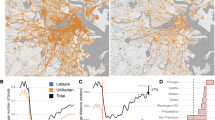
Effect of COVID-19 response policies on walking behavior in US cities
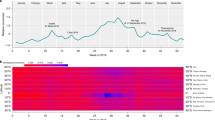
Mapping global variation in human mobility
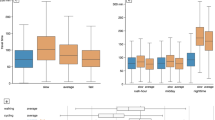
A travel time matrix data set for the Helsinki region 2023 that is sensitive to time, mode and interpersonal differences, and uses open data and novel open-source software
Background & summary.
The COVID-19 pandemic has spread across the world, infecting tens of millions and killing over one million people 1 . By March 2021, the United States (U.S.) had recorded the highest number of confirmed COVID-19 cases and COVID-19 related deaths in the world 1 . Since social distancing is one of the most effective measures in containing the spread of the infection 2 , several U.S. states issued various restrictions including stay at home orders. Moreover, numerous restaurants and bars closed for dine-in services, various recreation facilities were shut down, many offices and schools switched from meeting in-person to meeting online, and travel restrictions were imposed. These measures had a profound impact on how people in the U.S. went about their daily lives.
To understand the current and future impacts of the pandemic, we conducted a nationwide online survey. The goal of the survey is to capture attitudes and shifts in travel-related choices of people across the nation both during the pandemic and once COVID-19 is no longer a threat. The data are shared publicly in order to help government agencies and businesses prepare for the future. We are conducting additional survey waves with the same respondents to monitor how people’s choices evolve over the course of the pandemic and beyond.
An early version of the survey took place from April to June 2020, when the stay at home orders were in place in most parts of the country 3 , 4 ; this portion of the data collection is referenced as Wave 1 A . A slightly-modified larger-scale survey, Wave 1B ,was deployed between late June and October 2020. Subsequent survey waves are being conducted as the situation evolves. The collected data are released as they become available and necessary procedures for cleaning, documenting, and weighting the data are completed. This procedures for data processing are detailed in this paper. The present article focuses on data from the first wave of the survey.
In the months following the beginning of the spread of COVID-19, several efforts have been made to collect data related to COVID-19. In fact, many datasets have been compiled, specifically on COVID-19 testing 5 , medical imaging of COVID-19 cases 6 , the timeline of government interventions 7 , policy announcements 8 , implementation and relaxation of public health and social measures 9 , epidemiological data 10 , mobility-related data 11 , and out-of-home activity information 12 , to name a few. Researchers also turned to social media platforms, like Twitter and Instagram, to gather COVID-19-related data 13 , 14 , 15 , 16 . Furthermore, several surveys have been conducted to measure the impacts of the pandemic 17 , 18 , 19 , some of which are now released for public use 20 , 21 .
Our survey data are different from most others in several ways. First, it is comprehensive insofar as it includes data about a wide range of topics including commuting, daily travel, air travel, working from home, online learning, shopping, attitudes, risk perception, and socioeconomic and demographic details. Second, it captures detailed information about behaviors before and during the COVID-19 pandemic, as well as the choices that people expect to make when the COVID-19 virus is no longer a threat. Third, it was collected from respondents across the U.S., covering diverse socio-economic backgrounds, professions, education levels, and ages. Fourth, the survey is a true longitudinal panel survey, collecting data in multiple waves from the same individuals at regular intervals. Finally, the data are made publicly available to promote data-driven analysis and research.
The next section describes the data collection methodology, the questions included in the survey, the survey deployment process, and the participant recruitment strategy. Next, the data records section describes the data file types and metadata. Subsequently, the technical validation section explains the procedure for the survey data cleaning and weighting. Lastly, the final section provides additional notes for data users.
Ethical compliance
Our study protocol was approved by both Arizona State University (ASU) and University of Illinois at Chicago (UIC) Institutional Review Board offices. Participants were informed that their participation is voluntary, and that their responses are shared anonymously. An online informed consent was obtained from everyone who responded to the survey.
Survey questions
The data were collected through an extensive online survey with over 120 questions. The survey questions can be broadly divided into three categories: (1) retrospective questions focusing on the period before COVID-19, (2) questions about the period during COVID-19, and (3) prospective questions on respondent expectations for a future period in which COVID-19 is no longer a threat. The questions cover a wide variety of subjects including commuting habits, discretionary travel choices, work-related questions, study-related questions, shopping, dining, and so on – all before, during, and expected after the pandemic.
The survey questions can be classified into eight categories based on question subject type, namely: demographics, work, study, shopping and dining, transportation, and general attitudes. Table 1 describes each of these categories.
Survey recruitment
From April to mid-June 2020, initial Wave 1A responses were collected from a convenience sample via mailing lists, social media outreach, and mainstream media articles. A total of 1,110 responses were collected during this phase.
From late June onward, Wave 1B, the modified version of the survey, was deployed through survey invitations sent to a random email list purchased from a data marketing company. The list contained 350,000 email addresses belonging to people in 24 metropolitan areas across the U.S., as well as the state of Ohio (see Fig. 1 ). We purchased 100,000 additional email addresses of people randomly selected from across the country, including rural areas and excluding the areas covered by the first 350,000 emails. A total of 1,116 responses were received from the email list. Unfortunately, major email service providers quickly began marking our survey invitations as spam, while some smaller providers did not. While we took several steps to mitigate this issue, including changing the wording of the emails, changing the source of the emails (a uic.edu, asu.edu, or covidfuture.org email address), we were ultimately not able to fully solve this problem and saw a lower response rate from individuals with addresses from major email providers.
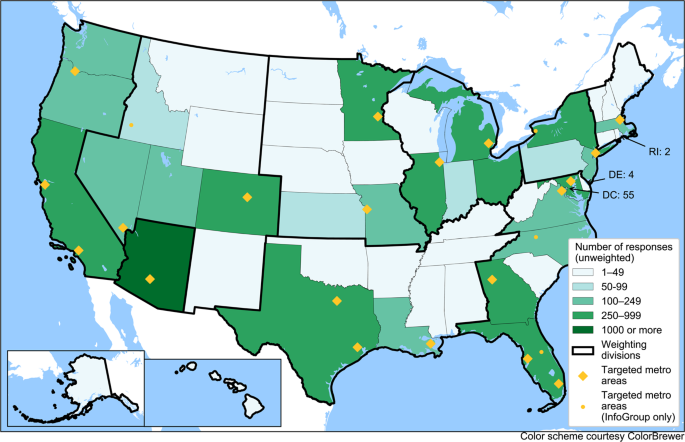
Distribution of survey respondents by the state of residence for survey dataset version 1.0. Alaska and Hawai’i are in the same weighting division as California, Oregon, and Washington.
Survey invitation emails were also sent to an additional list of approximately 39,000 email addresses from the Phoenix metropolitan area purchased for a previous survey effort 22 . This list yielded 782 responses. The survey invitation emails were sent using Amazon Web Services (AWS) and through the Qualtrics platform. Every 20 th respondent who was invited through the purchased email addresses received a $10 incentive as a gift card. Respondents also had the option to donate their survey incentive to a charity. Invitees received two reminders as part of efforts to maximize response rates.
An additional 5,250 responses to the Wave 1B survey were collected through a Qualtrics Online Panel. Qualtrics recruits these respondents from a variety of panels maintained by other firms and uses quota sampling to recruit respondents that are demographically representative of the nation. The Qualtrics quotas were set to collect information from 20 U.S. metropolitan areas, mostly consistent with the metropolitan areas sampled from the purchased email list, as well as the states of Ohio, Utah, North Carolina, upstate New York, and rural areas. In order to obtain samples that would represent the population in each of the selected geographies, quotas were imposed in the Qualtrics online panel subsample to guarantee representation based on income, age, race and ethnicity, and education. We requested all respondents to provide their email addresses in order to recontact them for subsequent survey waves. Since the Qualtrics respondents are professional survey takers, we designated most questions as mandatory, and we included attention check questions, which are shown to improve response quality 23 .
The distribution of responses by geography, as well as the targeted metropolitan areas, are shown in Fig. 1 . Figure 2 shows the distribution of responses by recruitment method, available in the “org” variable in the dataset. The geographical targets were chosen based on geographic and metropolitan area size diversity, as well as the state of the virus spread in May 2020.
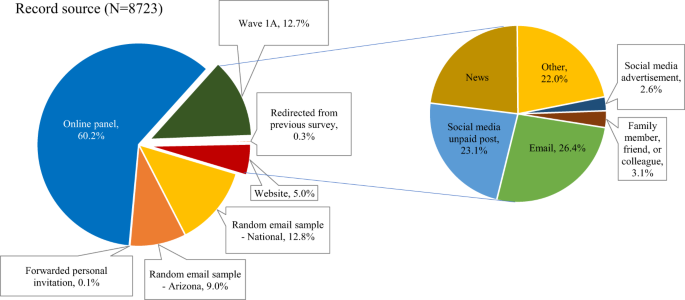
Distribution of Record by Source (from the survey dataset version 1.0).
Figure 1 shows the distribution of survey respondents across the U.S. (50 states and the District of Columbia). Following our recruitment strategy, a greater number of responses come from larger and more urban states. Arizona is overrepresented due to the oversample of Arizona respondents in the email-based deployment. The respondents from the initial Wave 1A sample are also more likely to hail from Arizona as the Arizona State University survey team’s network is heavily Arizona-based. When the data are weighted, any geographic discrepancies at the census division level are controlled and overrepresentation of Arizona is controlled/corrected separately.
Additional survey waves
To monitor how people’s attitudes and behaviors evolve, survey respondents are contacted again with at least two shorter follow-up surveys, approximately four months apart in spring and fall 2021.
Data Records
The survey dataset 24 can be accessed from the ASU Dataverse at: https://doi.org/10.48349/ASU/QO7BTC . The dataset is available in CSV (comma-separated value) format. Since the data will be updated periodically, the data are versioned—in this article, results from the survey dataset version 1.0 are reported. The dataverse also contains the database codebook containing the metadata and explaining the variables. The codebook contains a changelog for each new version.
The respondents to Waves 1A and 1B received similar but not identical surveys. We have merged the responses to these two versions of the survey into the final dataset wherever possible. For some variables, the questions were identical, whereas for other variables, harmonization of similar responses was required. In the dataset, variables ending in ‘_harm’ are harmonized between the two datasets, variables ending in ‘_w1a’ are available only for Wave 1A respondents, variables ending in ‘_w1b’ are available only for respondents from our Qualtrics Online Panel, purchased email lists, and anyone who found the survey via the COVIDFuture web site or email lists after June 19, 2020 (start date of Wave 1B). Variables with no suffix were asked the same way between the two surveys, and no harmonization was necessary. We also provide a file containing only Wave 1B responses and variables, which simplifies analysis of the Wave 1B data.
Technical Validation
Data cleaning.
To monitor respondents’ attention to survey questions in the Qualtrics online panel, attention check questions were included. Respondents were allowed to miss one attention check and be given an opportunity to answer that section again. If they missed an attention check twice, or both attention checks once, their survey was terminated.
We additionally undertook several quality checks to help ensure that the collected data were valid. We removed any respondents who reported that they shop for groceries both in-store and online every day, or expect to after the pandemic, as these are likely to be invalid responses. We also removed respondents who reported strongly agreeing or strongly disagreeing with all COVID-related attitudes, as some of these were worded positively and some negatively. Several additional quality checks were undertaken in the Qualtrics Online Panel as part of Qualtrics’ data cleaning process, including a check for people finishing the survey too quickly.
Respondents that did not report a state of residence, reported living outside the 50 states and the District of Columbia, or did not provide answers to all of the control variables used in the data weighting process described in the next section were removed from the data. Due to this restriction, 558 records with missing control variable information, 59 records with missing home location, and one response from Puerto Rico were not included in the final dataset encompassing responses received through October 14, 2020. Further steps in data preparation will include imputation of missing data, which will allow for some of these omitted records to be recovered in the next version of the dataset. Among the respondents who were not included in the dataset due to missing control variable information, there are 34 respondents who declared their gender as Other; these respondents could not be included because the Census offers no control marginals to weight these records. Further data weighting procedures will attempt to incorporate non-binary gendered individuals on the dataset. Due to the data cleaning and filtering process applied to responses obtained through October 14, 2020, a total of 618 records were not included in the published dataset.
Data weighting
Because the raw data are not fully representative of the U.S. population, weights were calculated using the following control variables: age, education, gender, Hispanic status, household income, presence of children, and number of household vehicles. The weighting procedure accounts for the true population characteristics at the person level. Household-level variables (i.e., income, presence of children, and number of vehicles) were controlled at the person level as well. For example, the marginal distribution used for presence of children refers to the share of adults aged 18 years and older living in household with children, instead of the share of households that have children as it is usually represented. Those marginal distributions were computed using data from the Integrated Public Use Microdata Sample and the American Community Survey (ACS) 2018 1-year data 25 using the sample 18 and older in each of the weighting region boundaries. A noteworthy consequence of this approach is that adjusted household weights are necessary to evaluate household-level characteristics since individuals from larger households are more likely to be represented in the survey (given there are more individuals in these households), and thus have a higher probability of being selected. Weights for household-level analysis can be computed by dividing the person-level weight (provided in the data) by the number of adults in the household.
The national sample was divided into nine regions based on the reported home state (Table 2 ). Each region’s sample was then weighted to match the distributions observed in ACS 2018 1-year estimates 25 , meaning that the survey is demographically representative at the level of each region as well as the entire U.S. The unweighted and weighted survey results are shown in Table 3 ; the weighted results closely replicate population distributions, with inevitable minor deviations on variables that were not controlled in the weighting process.
Weights were calculated using iterative proportional fitting (IPF) procedures embedded within the synthetic population generator PopGen2.0 26 , 27 , 28 . Univariate marginal control distributions were derived from the Integrated Public Use Microdata Sample, American Community Survey (ACS) 2018 1-year data 25 .
Usage Notes
Since the survey will be followed by at least two follow-up survey waves, the database will be updated periodically after the data for each wave is collected, cleaned, and weighted. Each version of the data will be uploaded to the ASU Dataverse and assigned a new DOI number, and all previous versions will remain available to promote reproducibility.
The weights were developed to produce a sample that is representative of the U.S. population, as well as representative of nine divisions within the U.S.: eight census regions (with East and West South Central combined due to small samples in these regions), and a separate category for Arizona due to its large number of respondents. The weights are not guaranteed to produce a representative sample for other (smaller) geographies. When evaluating subsamples at a finer geography (e.g., state or metropolitan area), data users should compare marginal distributions of key demographic variables with the census, and re-weight the data if needed to be representative of the area being analyzed.
Some questions differ between Waves 1A and 1B. Therefore, we have weighted the dataset twice: once including all respondents (Waves 1A and 1B), and once excluding respondents to the Wave 1A sample. Data users should use the Wave 1B weights whenever using variables that are not present in the convenience sample. Since Wave 1A data deviates significantly in terms of population representativeness 4 , there are no weights for questions asked only of Wave 1A respondents. In the file with only Wave 1B responses, only Wave 1B weights are presented.
This unique dataset provides insights on attitudes and behaviors not just before and during pandemic, but also on what might be expected after the pandemic. Possible use cases include modeling of during-pandemic and longer-term changes in mode use, air travel, transit ridership, work from home, and traffic congestion (especially for peak period traffic planning). Published uses of this dataset are documented in Capasso da Silva et al . 29 , Chauhan et al . 30 , Mirtich et al . 31 , and Salon et al . 32 .
Code availability
No codes were developed for this research.
COVID-19 Map. Johns Hopkins Coronavirus Resource Center https://coronavirus.jhu.edu/map.html (2020).
CDC. Coronavirus Disease 2019 (COVID-19). Centers for Disease Control and Prevention https://www.cdc.gov/coronavirus/2019-ncov/prevent-getting-sick/social-distancing.html (2020).
Shamshiripour, A., Rahimi, E., Shabanpour, R. & Mohammadian, A. K. How is COVID-19 reshaping activity-travel behavior? Evidence from a comprehensive survey in Chicago. Transp. Res. Interdiscip. Perspect. 7 , 100216 (2020).
PubMed PubMed Central Google Scholar
Conway, M. W., Salon, D., da Silva, D. C. & Mirtich, L. How will the COVID-19 pandemic affect the future of urban life? Early evidence from highly-educated respondents in the United States. Urban Sci. 4 , 50 (2020).
Article Google Scholar
Hasell, J. et al . A cross-country database of COVID-19 testing. Sci. Data 7 , 1–7 (2020).
Kalkreuth, R. & Kaufmann, P. COVID-19: a survey on public medical imaging data resources. ArXiv Prepr. ArXiv200404569 (2020).
Desvars-Larrive, A. et al . A structured open dataset of government interventions in response to COVID-19. medRxiv (2020).
Cheng, C., Barceló, J., Hartnett, A. S., Kubinec, R. & Messerschmidt, L. Covid-19 government response event dataset (coronanet v. 1.0). Nat. Hum. Behav. 4 , 756–768 (2020).
Zheng, Q. et al . HIT-COVID, a global database tracking public health interventions to COVID-19. Sci. Data 7 , 1–8 (2020).
Xu, B. et al . Epidemiological data from the COVID-19 outbreak, real-time case information. Sci. Data 7 , 1–6 (2020).
Pepe, E. et al . COVID-19 outbreak response, a dataset to assess mobility changes in Italy following national lockdown. Sci. Data 7 , 1–7 (2020).
Killeen, B. D. et al . A County-level dataset for informing the United States’ response to COVID-19. ArXiv Prepr. ArXiv200400756 (2020).
Chen, E., Lerman, K. & Ferrara, E. Tracking social media discourse about the COVID-19 pandemic: Development of a public coronavirus Twitter data set. JMIR Public Health Surveill. 6 , e19273 (2020).
Zarei, K., Farahbakhsh, R., Crespi, N. & Tyson, G. A first Instagram dataset on COVID-19. ArXiv Prepr. ArXiv200412226 (2020).
Alqurashi, S., Alhindi, A. & Alanazi, E. Large arabic twitter dataset on covid-19. ArXiv Prepr. ArXiv200404315 (2020).
Lopez, C. E., Vasu, M. & Gallemore, C. Understanding the perception of COVID-19 policies by mining a multilanguage Twitter dataset. ArXiv Prepr. ArXiv200310359 (2020).
Gensler. US Work from home survey 2020. Gensler-US-Work-From-Home-Survey-2020-Briefing-1.pdf (2020).
Kleinberg, B., van der Vegt, I. & Mozes, M. Measuring emotions in the covid-19 real world worry dataset. ArXiv Prepr. ArXiv200404225 (2020).
Grashuis, J., Skevas, T. & Segovia, M. S. Grocery shopping preferences during the COVID-19 pandemic. Sustainability 12 , 5369 (2020).
Article CAS Google Scholar
Shuja, J., Alanazi, E., Alasmary, W. & Alashaikh, A. Covid-19 open source data sets: A comprehensive survey. Appl. Intell . 1–30 (2020).
Trung, T. et al . Dataset of Vietnamese student’s learning habits during COVID-19. Data Brief 105682 (2020).
Khoeini, S. et al . Attitudes Towards Emerging Mobility Options and Technologies – Phase 2: Pilot and Full Survey Deployment . https://tomnet-utc.engineering.asu.edu/wp-content/uploads/2020/11/TOMNET-Year-2-Project-Report-All-Universities_-Attitudes-Towards-Mobility-Options-Technologies.pdf (2019).
Shamon, H. & Berning, C. Attention check items and instructions in online surveys: Boon or bane for data quality? Surv. Res. Methods Forthcom . (2019).
Salon, D. et al . COVID Future Wave 1 Survey Data v1.0.0. ASU Library Research Data Repository https://doi.org/10.48349/ASU/QO7BTC (2020).
Ruggles, S. et al . IPUMS USA: Version 10.0 Minneapolis, MN: IPUMS https://doi.org/10.18128/D010.V10.0 (2020).
PopGen. MARG - Mobility Analytics Research Group https://www.mobilityanalytics.org/popgen.html (2020).
Ye, X., Konduri, K., Pendyala, R. M., Sana, B. & Waddell, P. A methodology to match distributions of both household and person attributes in the generation of synthetic populations. In 88th Annual Meeting of the Transportation Research Board, Washington, DC (2009).
Konduri, K. C., You, D., Garikapati, V. M. & Pendyala, R. M. Enhanced synthetic population generator that accommodates control variables at multiple geographic resolutions. Transp. Res. Rec. 2563 , 40–50 (2016).
Capasso da Silva, D. et al . How are attitudes toward COVID-19 associated with traveler behavior during the pandemic? Findings https://doi.org/10.32866/001c.24389 (2021).
Chauhan, R. S. et al . COVID-19 related attitudes and risk perceptions across urban, rural, and suburban areas in the United States. Findings https://doi.org/10.32866/001c.23714 (2021).
Mirtich, L. et al . How stable are transport-related attitudes over time? Findings https://doi.org/10.32866/001c.24556 (2021).
Salon, D. et al . The potential stickiness of pandemic-induced behavior changes in the United States. Proceedings of the National Academy of Sciences 118 (27), e2106499118, https://doi.org/10.1073/pnas.2106499118 (2021).
Download references
Acknowledgements
This research was supported in part by the National Science Foundation (NSF) RAPID program under grants no. 2030156 and 2029962 and by the Center for Teaching Old Models New Tricks (TOMNET), a University Transportation Center sponsored by the U.S. Department of Transportation through grant no. 69A3551747116, as well as by the Knowledge Exchange for Resilience at Arizona State University. This COVID-19 Working Group effort was also supported by the NSF-funded Social Science Extreme Events Research (SSEER) network and the CONVERGE facility at the Natural Hazards Center at the University of Colorado Boulder (NSF Award #1841338) and the NSF CAREER award under grant no. 155173. Any opinions, findings, and conclusions or recommendations expressed in this material are those of the authors and do not necessarily reflect the views of the funders.
Author information
Authors and affiliations.
Department of Civil, Materials, and Environmental Engineering, University of Illinois at Chicago, Chicago, IL, USA
Rishabh Singh Chauhan, Ali Shamshiripour, Ehsan Rahimi, Abolfazl (Kouros) Mohammadian & Sybil Derrible
School of Geographical Sciences and Urban Planning, Arizona State University, Tempe, AZ, USA
Matthew Wigginton Bhagat-Conway & Deborah Salon
School of Sustainable Engineering and the Built Environment, Arizona State University, Tempe, AZ, USA
Denise Capasso da Silva, Sara Khoeini & Ram Pendyala
You can also search for this author in PubMed Google Scholar
Contributions
R.P., A.M., S.D., D.S. and S.K. planned the project. D.S., M.C., D.C.S., R.C., E.R. and A.M. prepared the survey questions. M.C., D.C.S. and D.S. designed the survey flow logic. R.C., D.C.S., M.C., D.S. and S.D. deployed the survey. M.C. and D.C.S. performed data cleaning and survey data analysis. D.C.S. weighted the dataset. M.C. and D.S. worked on sending out the incentives to the selected respondents. R.C. prepared the first draft. All the authors made significant contributions to manuscript editing and approving the final version of the manuscript.
Corresponding author
Correspondence to Rishabh Singh Chauhan .
Ethics declarations
Competing interests.
The authors declare no competing interests.
Additional information
Publisher’s note Springer Nature remains neutral with regard to jurisdictional claims in published maps and institutional affiliations.
Rights and permissions
Open Access This article is licensed under a Creative Commons Attribution 4.0 International License, which permits use, sharing, adaptation, distribution and reproduction in any medium or format, as long as you give appropriate credit to the original author(s) and the source, provide a link to the Creative Commons license, and indicate if changes were made. The images or other third party material in this article are included in the article’s Creative Commons license, unless indicated otherwise in a credit line to the material. If material is not included in the article’s Creative Commons license and your intended use is not permitted by statutory regulation or exceeds the permitted use, you will need to obtain permission directly from the copyright holder. To view a copy of this license, visit http://creativecommons.org/licenses/by/4.0/ .
The Creative Commons Public Domain Dedication waiver http://creativecommons.org/publicdomain/zero/1.0/ applies to the metadata files associated with this article.
Reprints and permissions
About this article
Cite this article.
Chauhan, R.S., Bhagat-Conway, M.W., Capasso da Silva, D. et al. A database of travel-related behaviors and attitudes before, during, and after COVID-19 in the United States. Sci Data 8 , 245 (2021). https://doi.org/10.1038/s41597-021-01020-8
Download citation
Received : 14 December 2020
Accepted : 29 July 2021
Published : 23 September 2021
DOI : https://doi.org/10.1038/s41597-021-01020-8
Share this article
Anyone you share the following link with will be able to read this content:
Sorry, a shareable link is not currently available for this article.
Provided by the Springer Nature SharedIt content-sharing initiative
This article is cited by
Covid future panel survey: a unique public dataset documenting how u.s. residents’ travel-related choices changed during the covid-19 pandemic.
- R. S. Chauhan
- M. Bhagat-Conway
Transportation (2024)
The interaction between the recent evolution of working from home and online shopping
- Motahare Mohammadi
- Amir Davatgari
- Deborah Salon
Response willingness in consecutive travel surveys: an investigation based on the National Household Travel Survey using a sample selection model
- F. Atiyya Shaw
- Kari E. Watkins
Transportation (2023)
Tracking the state and behavior of people in response to COVID-19 through the fusion of multiple longitudinal data streams
- Mohamed Amine Bouzaghrane
- Hassan Obeid
- Joan Walker
Quick links
- Explore articles by subject
- Guide to authors
- Editorial policies
Sign up for the Nature Briefing newsletter — what matters in science, free to your inbox daily.
Official websites use .gov A .gov website belongs to an official government organization in the United States.
Secure .gov websites use HTTPS A lock ( A locked padlock ) or https:// means you’ve safely connected to the .gov website. Share sensitive information only on official, secure websites.
- Search ITA Search

Travel and Tourism Research
National travel and tourism research.
The National Travel and Tourism’s (NTTO) research products provide critical market intelligence to a range of stakeholders, including agencies within the U.S. Department of Commerce, other federal departments and agencies, Congressional offices, local and state policymakers, domestic travel and tourism industry firms and organizations, foreign governments and companies, the media, and academia, and more.
Travel and Tourism Statistics, Research Programs, and Monitors

Download the National Travel and Tourism Office’s collection of PDF fact sheets and reports. They reflect the latest trends and information on the international travel and tourism industry market.
- U.S. Travel and Tourism Fast Facts
- Top Export Market Rankings

Discover Travel and Tourism Industry News “TI News”
Sign up to receive Travel and Tourism Industry News “TI News” e-mail updates. Receive updates from NTTO featuring the latest data and research releases, and other information related to international travel to and from the United States right to your inbox!

Discover the faces behind our amazing research team!

Have a question or need assistance? Reach out to our team and we will get back to you as soon as possible.
We deliver data and analytics that are confidential, accurate and actionable, and our comprehensive solution empowers our clients to strategize and compete within their markets.

Company Overview
STR is the global leader in hospitality data benchmarking, analytics and marketplace insights. Founded in 1985, STR maintains a robust global presence with regional offices strategically located in Nashville, London, and Singapore. In October 2019, STR was acquired by CoStar Group, Inc. (NASDAQ: CSGP), a leading provider of online real estate marketplaces, information and analytics in the commercial and residential property markets.
CoStar Group’s mission
We are digitizing the world's real estate, empowering all people to discover properties, insights, and connections that improve their businesses and lives. Learn about our core values.

Mit Shah, Senior Managing Principal & CEO , Noble Investment Group
Mark hoplamazian, president and ceo , hyatt hotels corporation, chuck pinkowski, founder , pinkowski & company.
US Travel Header Utility Menu
- Future of Travel Mobility
- Commission on Seamless & Secure Travel
- Travel Works
Header Utility Social Links
- Follow us on FOLLOW US
- Follow us on Twitter
- Follow us on LinkedIn
- Follow us on Instagram
- Follow us on Facebook
User account menu
The latest travel data.
MONTHLY INSIGHTS March 04, 2024

U.S. Travel has temporarily paused our monthly data newsletter, however, the latest travel data is still available via the U.S. Travel Insights Dashboard . This dashboard is updated each month (member login required).
The U.S. Travel Insights Dashboard , developed in collaboration with Tourism Economics, is supported by more than 20 data sources. The dashboard is the most comprehensive and centralized source for high-frequency intelligence on the U.S. travel industry, tracking industry performance, travel volumes and predictive indicators of recovery including air and lodging forecasts, DMO website traffic, convention and group trends, travel spending and losses, traveler sentiment, among others to measure the health of the industry.
Key Highlights January 2024:
- Travel appetite started the year on a softer note, but overall growth continued. Air passenger growth remained positive, up 6% versus the prior year but lower than the double-digit growth seen through 2023. Foreign visits remained strong, up 24% YoY.
- Hotel room demand continued a trend of slight contraction falling 1% versus the prior year, while short-term rental demand grew 1%, a lower rate than 2023.
- A particular bright spot was that group room demand within the top 25 markets displayed solid growth of 9% relative to the prior year.
- The outlook for the economy remains fairly optimistic due to the strength of the labor market, looser financial conditions and healthy household and nonfinancial corporate balance sheets. This has filtered through to slightly higher consumer sentiment in February.
- Sentiment is also growing for upcoming leisure travel in 2024. The share of travelers reporting having travel plans within the next six months increased to 93% in January from 92% in December, according to Longwoods International’s monthly survey.
- Travel price inflation (TPI) fell slightly in January as a result of falling transportation prices. Sticky services inflation should see relief from decelerating wage growth. However, upside risks stem from rising healthcare costs, supply chain disruptions and slowing labor supply. Source: U.S. Travel Association and Tourism Economics
Member Price:
Non-Member Price: Become a member to access.
ADDITIONAL RESEARCH
Travel Price Index
Travel Forecast
Quarterly Consumer Insights
Additional monthly insights are available through the full U.S. Travel Monthly Data Report, exclusive to members. Please inquire with membership if you are interested in learning about becoming a member of U.S. Travel Association.

What Is Travel and Tourism Research Association?
By Michael Ferguson
Travel and Tourism Research Association (TTRA) is a global organization that provides a platform for travel and tourism professionals to share knowledge, insights, and research in the industry. With over 700 members from 30 countries, TTRA is one of the most important organizations in the field of travel and tourism research.
History of TTRA
TTRA was founded in 1970 as the Travel Research Association (TRA) in the United States. In 1997, it merged with the International Association of Travel and Tourism Research (IATTR) to form TTRA as we know it today. Since then, TTRA has expanded its reach beyond North America and has become a truly global organization.
The primary objective of TTRA is to promote and enhance research in the travel and tourism industry. It aims to do this by providing a platform for professionals to exchange ideas, share research findings, and collaborate on projects. The organization also strives to promote education in travel and tourism research through conferences, workshops, webinars, publications, and other resources.
Membership Benefits
TTRA membership comes with several benefits such as access to publications like the Journal of Travel Research (JTR), discounts on conferences and events, access to job postings among others. Members also get exclusive access to a global network of industry professionals that can help them stay updated on current trends in the industry.
Annual Conference
The annual conference organized by TTRA is one of its most significant events. The conference brings together researchers from around the world who present their latest findings on various topics related to travel and tourism. The conference also features keynote speakers who are experts in their field sharing their insights on current issues affecting the industry.
10 Related Question Answers Found
What is travel and tourism association, what is a tourism marketing association, what are tourism industry associations, what is national tourism association, what is the medical tourism association, what is the meaning of tourism organization, what do tourism associations do, what are the different tourism organizations, what is tourism and hospitality network, what is tourism organization, backpacking - budget travel - business travel - cruise ship - vacation - tourism - resort - cruise - road trip - destination wedding - tourist destination - best places, london - madrid - paris - prague - dubai - barcelona - rome.
© 2024 LuxuryTraveldiva

Suggested Searches
- Climate Change
- Expedition 64
- Mars perseverance
- SpaceX Crew-2
- International Space Station
- View All Topics A-Z
Humans in Space
Earth & climate, the solar system, the universe, aeronautics, learning resources, news & events.

Hubble Spots a Grand Spiral of Starbursts

Does Distant Planet Host Volcanic Moon Like Jupiter’s Io?

What’s Up: October 2024 Skywatching Tips from NASA
- Search All NASA Missions
- A to Z List of Missions
- Upcoming Launches and Landings
Spaceships and Rockets
- Communicating with Missions
- James Webb Space Telescope
- Hubble Space Telescope
- Why Go to Space
- Commercial Space
- Destinations
- Living in Space
- Explore Earth Science
- Earth, Our Planet
- Earth Science in Action
- Earth Multimedia
- Earth Science Researchers
- Pluto & Dwarf Planets
- Asteroids, Comets & Meteors
- The Kuiper Belt
- The Oort Cloud
- Skywatching
- The Search for Life in the Universe
- Black Holes
- The Big Bang
- Dark Energy & Dark Matter
- Earth Science
- Planetary Science
- Astrophysics & Space Science
- The Sun & Heliophysics
- Biological & Physical Sciences
- Lunar Science
- Citizen Science
- Astromaterials
- Aeronautics Research
Human Space Travel Research
- Science in the Air
- NASA Aircraft
- Flight Innovation
- Supersonic Flight
- Air Traffic Solutions
- Green Aviation Tech
- Drones & You
- Technology Transfer & Spinoffs
- Space Travel Technology
- Technology Living in Space
- Manufacturing and Materials
- Science Instruments
- For Kids and Students
- For Educators
- For Colleges and Universities
- For Professionals
- Science for Everyone
- Requests for Exhibits, Artifacts, or Speakers
- STEM Engagement at NASA
- NASA's Impacts
- Centers and Facilities
- Directorates
- Organizations
- People of NASA
- Internships
- Our History
- Doing Business with NASA
- Get Involved
NASA en Español
- Aeronáutica
- Ciencias Terrestres
- Sistema Solar
- All NASA News
- Video Series on NASA+
- Newsletters
- Social Media
- Media Resources
- Upcoming Launches & Landings
- Virtual Guest Program
- Image of the Day
- Sounds and Ringtones
- Interactives
- STEM Multimedia

NASA’s Hubble Watches Jupiter’s Great Red Spot Behave Like a Stress Ball

Artemis I Radiation Measurements Validate Orion Safety for Astronauts

NASA’s Roman Space Telescope’s ‘Exoskeleton’ Whirls Through Major Test

Pioneering NASA Astronaut Health Tech Thwarts Heart Failure

Kathryn Sullivan: The First American Woman to Walk in Space

NASA Astronauts, Leadership Visit Children’s Hospital, Cancer Moonshot Event

First Greenhouse Gas Plumes Detected With NASA-Designed Instrument

NASA-Funded Study Assesses Pollution Near Los Angeles-Area Warehouses

NASA Efforts on Hurricane Milton

Eclipse Megamovie Coding Competition

Journey to a Water World: NASA’s Europa Clipper Is Ready to Launch

Can Life Exist on an Icy Moon? NASA’s Europa Clipper Aims to Find Out

Hubble Observes a Peculiar Galaxy Shape

Revealing the Hidden Universe with Full-shell X-ray Optics at NASA MSFC
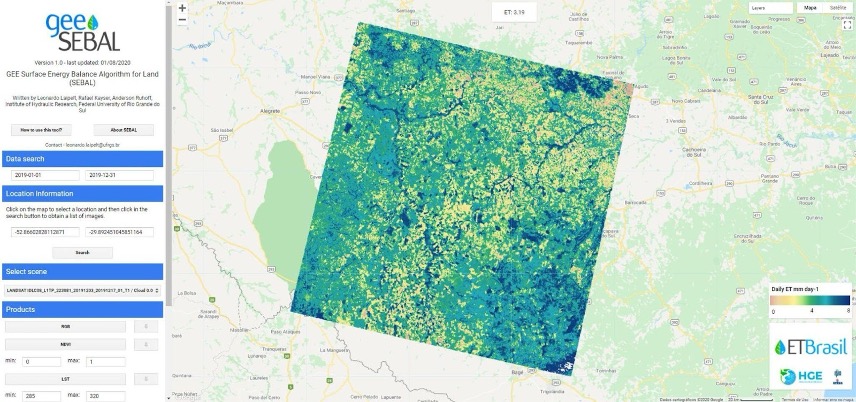
OpenET: Balancing Water Supply and Demand in the West

NASA Spotlight: Felipe Valdez, an Inspiring Engineer

A Serendipitous NASA Family Reunion
Una reunión familiar de la nasa por casualidad.

Controlled Propulsion for Gentle Landings
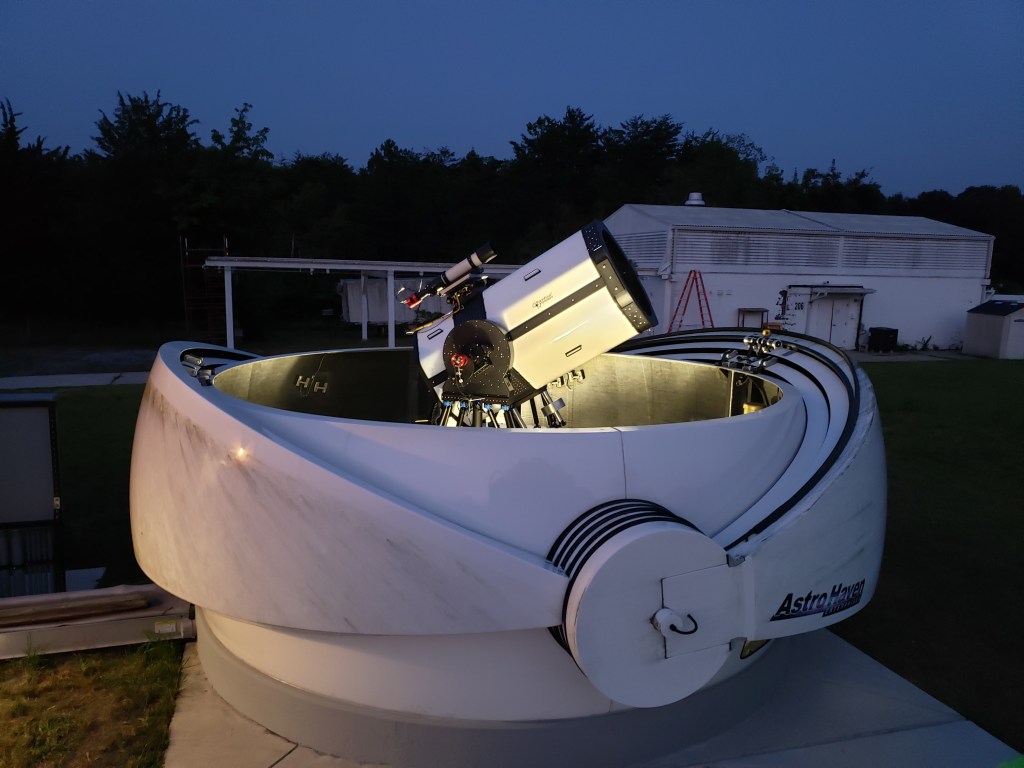
NASA Terminal Transmits First Laser Communications Uplink to Space

Journey Through Stars with NASA in New Minecraft Game

NASA Celebrates Hispanic Heritage Month 2024

Una gerente de proyectos de la NASA rinde homenaje a la influencia de su madre

La NASA invita a los medios al lanzamiento de Europa Clipper

El X-59 de la NASA avanza en las pruebas de preparación para volar
From studies that seek to understand how the human body adapts to time in space to research on spacesuits and spacecraft, NASA works to ensure the safety of astronauts as they push the boundaries of space exploration.

Learn More About Human Space Travel Research

The Body in Space
Spaceflight affects bones, muscles, vision, and more. Learn about the changes humans may undergo during spaceflight, as well as the steps NASA takes to keep astronauts healthy and safe.

Research in Space
NASA seeks to understand how the human body changes while astronauts live and work on the space station. Learn how scientists work to maintain the health and well-being of crew members during and after their missions.
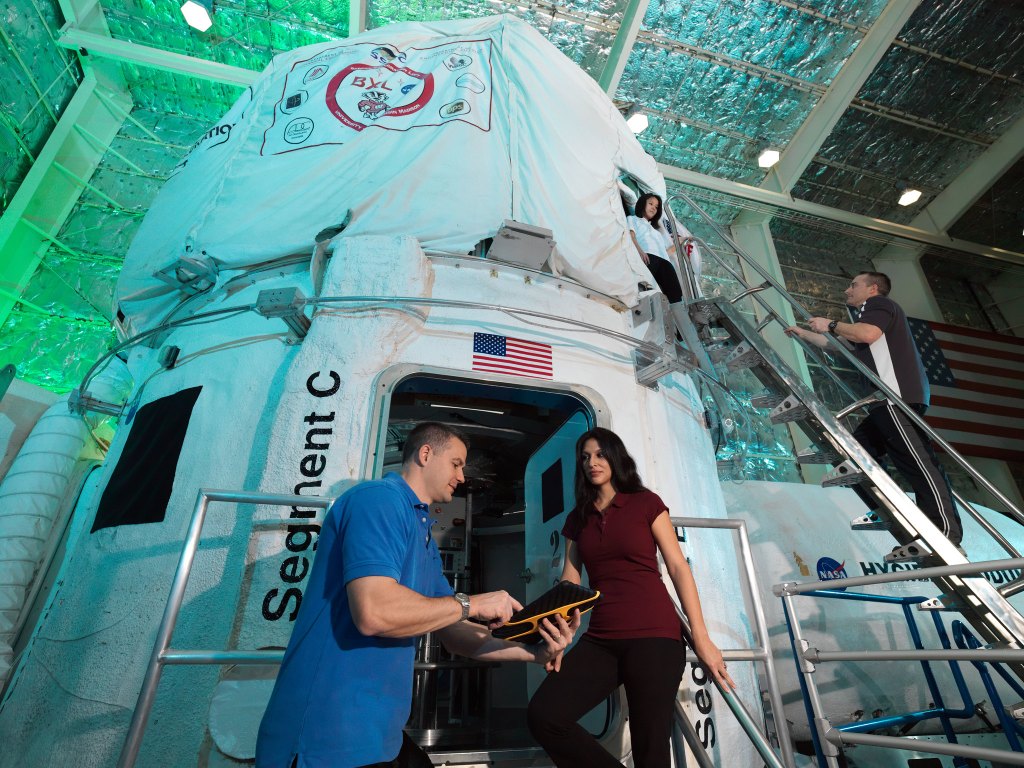
Research on Earth
NASA conducts Earth-bound simulations of life in space. Learn how scientists use such missions to study the way humans adapt to challenges astronauts may encounter on journeys to the Moon and Mars.

Extended Stays in Space
Frank Rubio, Mark Vande Hei, Scott Kelly, and others have spent an extended amount of time in space. Learn about the record-holders for the longest continuous spaceflights by U.S. astronauts.
Collaborate With Us
Are you developing innovative ways to keep astronauts healthy and mission-ready ? Partner with NASA’s Human Research Program (HRP)! Check out information on NSPIRES and internships, and explore our how-to guides for working with us.
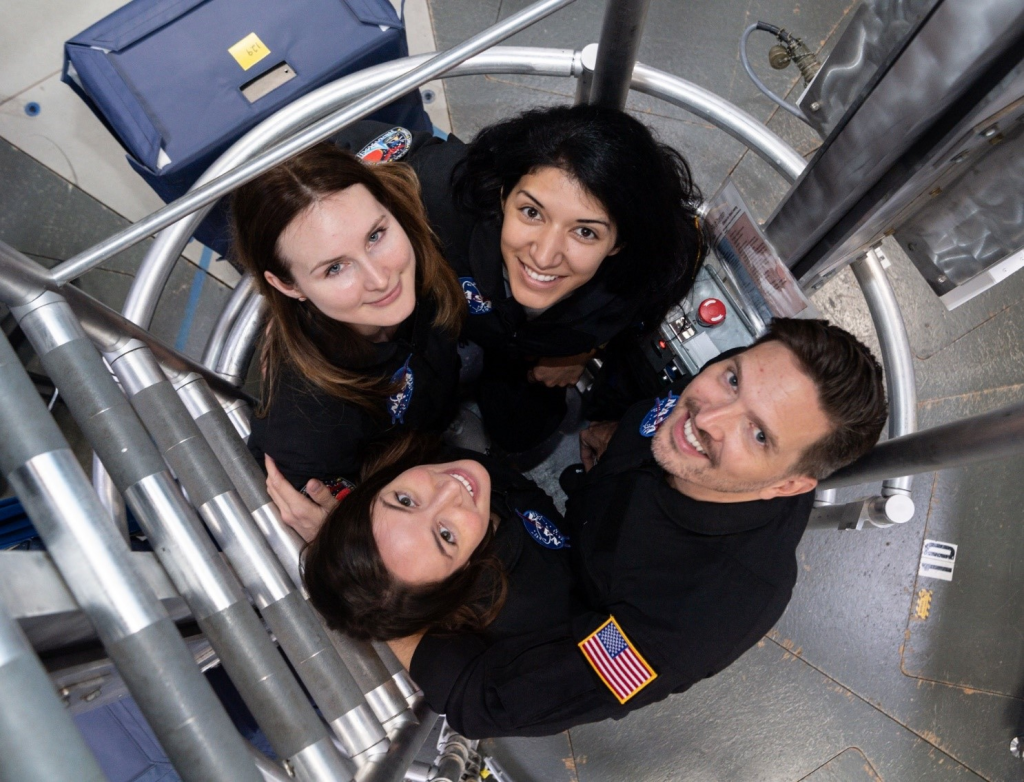
Staying Healthy in Space
Experiments to Unlock How Human Bodies React to Long Space Journeys

Astronaut Exercise

Station Science 101: Studying DNA in Space
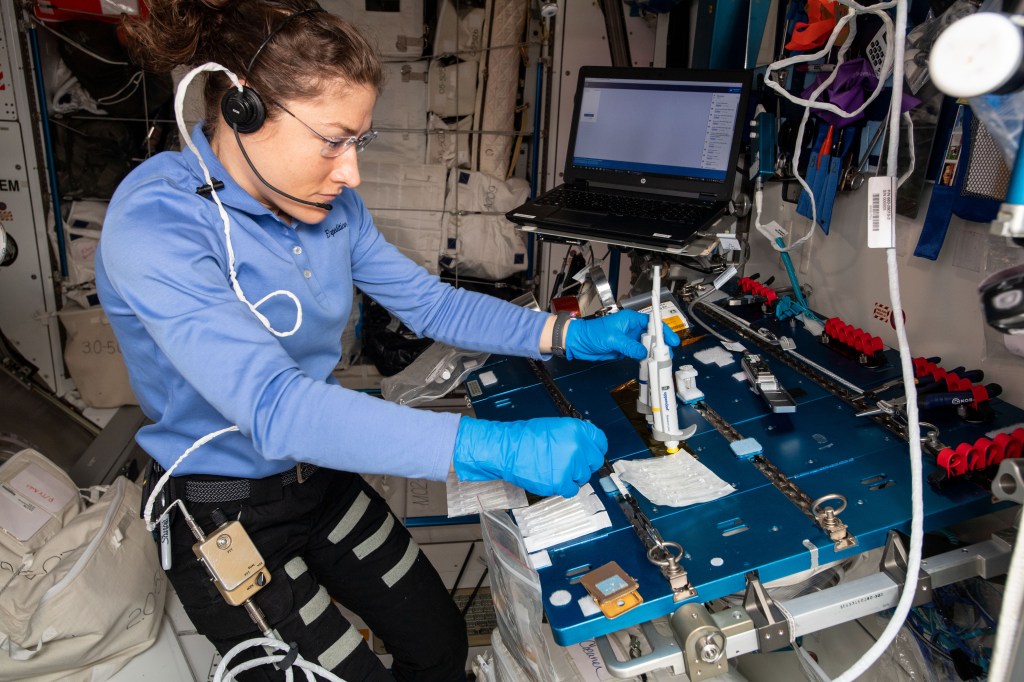
Counteracting Bone and Muscle Loss in Microgravity

NASA Harnesses US Navy Spinning Device to Simulate Spaceflight

Isolation – What Can We Learn From the Experiences of NASA Astronauts?

New Tests Evaluate Mission Readiness of Astronauts Upon Landing

Scientists Probe How Long-Term Spaceflight Alters Immunity
More than 50 years of NASA expertise is going into the design of modern spacesuits that will protect and support astronauts as they reach iconic heights during forays in low-Earth orbit, the Moon, and worlds beyond.

Top Five Technologies Needed for a Spacecraft to Survive Deep Space
When a spacecraft built for humans ventures into deep space, it requires an array of features to keep it and…

Food in Space
Astronauts require food that is nutritious, appetizing, long-lasting, easy to make, and more. We strive to continuously improve the quality of space food and to satisfy the dietary needs of crew members on increasingly longer and more distant spaceflight missions.
The Menu for Mars: Designing a Deep Space Food System
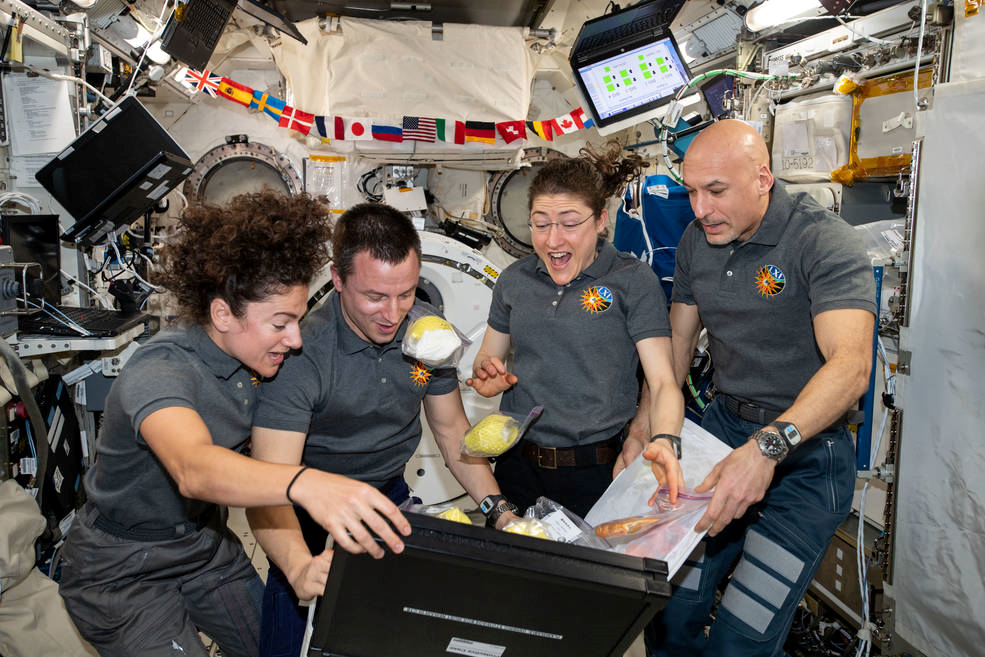
How Does Spaceflight Change Food Appeal?

Enhanced Diet May Help Astronauts Adapt to Spaceflight

Space Food Systems

Space Simulations on Earth as a Research Tool
Take a peek into the lives of crew on a simulated mission to Mars. Confined inside NASA's Human Exploration Research Analog (HERA), these crew help researchers study how teams overcome isolation and confinement to accomplish mission-critical tasks.

Benefits to Humanity
Space exploration unites the world to inspire the next generation, make ground-breaking discoveries, and create new opportunities.
Technologies and missions we develop for human spaceflight have thousands of applications on Earth, boosting the economy, creating new career paths, and advancing everyday technologies all around us.

Discover More Topics From NASA
Human Research Program

Space Station Research and Technology

- Alzheimer's disease & dementia
- Arthritis & Rheumatism
- Attention deficit disorders
- Autism spectrum disorders
- Biomedical technology
- Diseases, Conditions, Syndromes
- Endocrinology & Metabolism
- Gastroenterology
- Gerontology & Geriatrics
- Health informatics
- Inflammatory disorders
- Medical economics
- Medical research
- Medications
- Neuroscience
- Obstetrics & gynaecology
- Oncology & Cancer
- Ophthalmology
- Overweight & Obesity
- Parkinson's & Movement disorders
- Psychology & Psychiatry
- Radiology & Imaging
- Sleep disorders
- Sports medicine & Kinesiology
- Vaccination
- Breast cancer
- Cardiovascular disease
- Chronic obstructive pulmonary disease
- Colon cancer
- Coronary artery disease
- Heart attack
- Heart disease
- High blood pressure
- Kidney disease
- Lung cancer
- Multiple sclerosis
- Myocardial infarction
- Ovarian cancer
- Post traumatic stress disorder
- Rheumatoid arthritis
- Schizophrenia
- Skin cancer
- Type 2 diabetes
- Full List »
share this!
October 15, 2024
This article has been reviewed according to Science X's editorial process and policies . Editors have highlighted the following attributes while ensuring the content's credibility:
fact-checked
peer-reviewed publication
trusted source
Novel app tracks travel-related illnesses
by University of Zurich

Travelers sometimes pick up more than just memories when they go abroad. Unfortunately, they may also experience health issues brought about by pathogens. Data collected by a novel travel app developed by UZH researchers in cooperation with the World Health Organization (WHO) now shows that this happens remarkably often.
The app is not only useful for travelers but may also help track outbreaks and the spread of infectious diseases such as dengue or novel influenza viruses. The findings are published in the journal BMJ Open .
"Travelers are an excellent reflection of what's happening around the globe," says study leader Patricia Schlagenhauf from the Epidemiology, Biostatistics and Prevention Institute at UZH. "They also often play a part in introducing pathogens to different regions of the world." By way of example, she cites the recent case of mpox in Sweden, which was imported by a traveler returning from Africa.
Tracking the spread of infections
The Illness Tracking in Travelers (ITIT) app lets people who are on the move report daily symptoms by filling in a short, user-friendly questionnaire. This information is then linked to location data as well as climate and air quality information.
The research team has now analyzed data collected through the app between April 2022 and July 2023. The analysis covered 470 trips recorded by 609 people across all continents. Travelers fell ill surprisingly often during their travels, with health issues occurring on more than one-third of trips.

Gastrointestinal symptoms top the list
The most common health issues were gastrointestinal symptoms , which were reported in 19% of trips and most frequently in travelers to Asia. In contrast, these symptoms occurred less often in people traveling to Africa.
Significantly more women than men reported symptoms of diarrhea. It is possible that women are more susceptible to diarrhea, or that they were more conscientious when recording symptom information in the app.
By contrast, respiratory diseases (17%) such as colds were most common among travelers in Europe. "Don't forget that you should carry a first-aid kit even when you're traveling to supposedly low-risk countries like France or Greece," says Schlagenhauf.
She recommends that travelers pack medication to treat diarrhea, nausea, headache and fever, since these are the health issues that people are most restricted by on their travels, according to the study.
Healthy and safe travels
The research team would now like to invite even more people to use the app. Larger sets of data would enable the researchers to run automated analyses using artificial intelligence , which could, for example, be used to detect outbreaks of dengue or mpox at an early stage.
"This real-time bottom-up approach is much faster than top-down reporting systems," says Schlagenhauf. Even in well-organized government bodies such as the Swiss Federal Office of Public Health, it often takes months for case numbers to be available.
"Mobile technologies offer a revolutionary solution to how we track travel-related illnesses. This will ultimately make our travels safer and healthier."
Explore further
Feedback to editors

Innovative tactile technology helps hearing-impaired individuals by enhancing external spatial positions and movement
45 minutes ago

New study reveals promising therapy that blocks microRNAs to treat myotonic dystrophy type 1
58 minutes ago

Training medical image analysis AI with knowledge, not shortcuts

In beer yeast, scientists find potential path to starving cancer

Bursts of exercise boost cognitive function, neuroscientists find

Researchers show tumor evolution is written in the genome

Artificial mouth mimics human tongue movements to understand the oral processing of soft foods

Scientists identify key protein in the inflammatory pathway driving fatty liver disease

Researchers show how nutrients and organelle signaling shape tissue immunity

New study traces Alzheimer's 'pathology clock' at unprecedented cellular resolution
Related stories, cdc: oropouche virus cases identified in u.s. travelers returning from cuba.
Sep 3, 2024

What to know about the Oropouche virus, also known as sloth fever
Aug 28, 2024

Physician offers advice for preventing traveler's diarrhea
Jul 29, 2024

GI disease is most common diagnosis for nonmigrant U.S. travelers
Jun 29, 2023

What is oropouche virus? CDC warns of cases linked to South America travel
Aug 20, 2024

FDA approves drug for treatment of travelers' diarrhea
Nov 22, 2018
Recommended for you

Enhancing MRI with AI to improve diagnosis of brain disorders
22 hours ago

New clinical model for predicting hip fractures could save lives
Oct 14, 2024

Inside RSV: Researchers pinpoint markers of more severe cases
Oct 12, 2024

Framework reveals how neglecting income, education and ethnicity affects disease spread predictions on COVID-19 data
Oct 11, 2024

An AI-powered pipeline for personalized cancer vaccines
Let us know if there is a problem with our content.
Use this form if you have come across a typo, inaccuracy or would like to send an edit request for the content on this page. For general inquiries, please use our contact form . For general feedback, use the public comments section below (please adhere to guidelines ).
Please select the most appropriate category to facilitate processing of your request
Thank you for taking time to provide your feedback to the editors.
Your feedback is important to us. However, we do not guarantee individual replies due to the high volume of messages.
E-mail the story
Your email address is used only to let the recipient know who sent the email. Neither your address nor the recipient's address will be used for any other purpose. The information you enter will appear in your e-mail message and is not retained by Medical Xpress in any form.
Newsletter sign up
Get weekly and/or daily updates delivered to your inbox. You can unsubscribe at any time and we'll never share your details to third parties.
More information Privacy policy
Donate and enjoy an ad-free experience
We keep our content available to everyone. Consider supporting Science X's mission by getting a premium account.
E-mail newsletter

COMMENTS
Journal of Travel Research (JTR) is the premier research journal focusing on travel and tourism behavior, management and development. As a top-ranked journal focused exclusively on travel and tourism, JTR provides up-to-date, high quality, international and multidisciplinary research on behavioral trends and management theory.JTR is a category 4 ranked journal by the Association of Business ...
100+ Tourism Research Topics: Category Wise. Sustainable Tourism. Impact of Technology on Travel. Cultural Tourism and Heritage Preservation. Dark Tourism: Ethics and Motivations. Community-Based Tourism for Socioeconomic Development. Wildlife Tourism and Conservation. Gastronomic Tourism: Culinary Experiences.
The Journal of Travel Research (JTR) is the premier, peer-reviewed research journal focusing on the business of travel and tourism development, management, marketing, economics and behavior.JTR provides researchers, educators, and professionals with up-to-date, high quality research on behavioral trends and management theory for one of the most influential and dynamic industries.
Join the world's leading travel and tourism research association. TTRA is the leading advocate for higher standards in travel and tourism-related research, analysis, and marketing. For over 50 years, TTRA has been the industry's leader for go-to, evidence-based, global travel and tourism data and analysis. Why We Do What We Do: We ...
The U.S. travel market has seen 51% growth YoY - 7 key takeaways from each segment of U.S. travel. (Click image to view a larger version.) U.S. Travel Market Report 2022-2026 and the entire report series features an overview of the U.S. travel market, along with detailed data and analysis of five key segments: airline, hotel & lodging, car ...
U.S. Travel is the authoritative leader in travel research. You will receive valuable data, trends and insights to assist you in strategically planning your marketing efforts, efficiently spend your travel promotional funds and make better educated business decisions.
Recent Research Reports. Following the robust 2022 recovery, the U.S. travel market is still re-establishing travel normality, and therefore some fluctuation is ongoing. Featuring healthy 13% year-over-year growth in 2023, the... Phocuswright has tracked the travel startup landscape for well over a decade. During this time, the digital travel ...
Travel research online is the key to unlocking amazing adventures in the digital age. It's hard to find trustworthy travel info because there's so much out there. We made this guide so you can confidently and easily research travel online. With our experience, we have visited many places, found simple solutions, and had unforgettable trips. ...
About TTRA - TTRA is the leading advocate for higher travel and tourism-related research, analysis, and marketing standards. With over 50 years of experience, we are the go-to source for evidence-based, global travel and tourism data and analysis. Travel and tourism professionals need world-class research to make informed decisions.
The Skift Travel 200 combines the financial performance of nearly 200 travel companies worth more than a trillion dollars into a single number. The ST200 makes it easy to track travel industry performance for the first time ever. Learn more about the ST200 by reading our full methodology.
This research responds to earlier calls to integrate research on travel medicine and tourism. It critically reviews the literature published on these topics over a 50-year period (1970 to 2020) using CiteSpace software. Some 802 articles were gathered and analyzed from major databases including the Web of Science and Scopus. Markets (demand and ...
Travel is roaring back after the COVID-19 pandemic nearly decimated the industry. Here are the biggest trends reshaping the travel landscape. ... McKinsey research has shown that the top factor influencing customer loyalty in the lodging sector is "an experience worth paying more for"—not the product. Train staff to focus on tiny details ...
Sabre has always been at the forefront of research and development in travel, first and foremost through Sabre Labs, the world's first travel-focused innovation lab. Founded in 1996, Sabre Labs explores novel uses of big data, machine learning, AI and other emerging technologies to shape the future of travel. The group mission is to create ...
Measurement(s) travel-related behavior • travel-related attitude Technology Type(s) Survey Factor Type(s) temporal interval Sample Characteristic - Organism Homo sapiens Sample Characteristic ...
Usman Khalid. Luke Emeka Okafor. Olajide Idris Sanusi. Preview abstract. Restricted access Research article First published February 5, 2021 pp. 696-714. xml GET ACCESS. Table of contents for Journal of Travel Research, 61, 3, Mar 01, 2022.
There is a distinction between the how and the what of tourists' motivation. An earlier review described and critiqued theoretical and conceptual frameworks that emerged in the past half-century of research in tourism motivation (Crompton & Petrick, 2024).Its focus was on the mechanisms that explain how psychological processes transition a motivational state into action.
Travel and Tourism Research. The official U.S. government source for data and analysis on international travel to and from the United States. The National Travel and Tourism Office is charged with managing, improving, and expanding the system of travel statistics to fully account for and report on the impact of U.S. travel and tourism.
About These Reports. This is the latest in a series of reports and data products that Skift Research puts out to help you analyze the biggest trends in the travel industry.
Travel market research provides valuable insights into competitors' strategies, strengths, and weaknesses, enabling businesses to position themselves strategically and capitalize on untapped opportunities. Additionally, by conducting thorough market research, businesses can mitigate risks by identifying potential pitfalls, assessing market ...
STR is the global leader in hospitality data benchmarking, analytics and marketplace insights. Founded in 1985, STR maintains a robust global presence with regional offices strategically located in Nashville, London, and Singapore. In October 2019, STR was acquired by CoStar Group, Inc. (NASDAQ: CSGP), a leading provider of online real estate ...
The Latest Travel Data. MONTHLY INSIGHTS March 04, 2024. U.S. Travel has temporarily paused our monthly data newsletter, however, the latest travel data is still available via the U.S. Travel Insights Dashboard. This dashboard is updated each month (member login required). The U.S. Travel Insights Dashboard, developed in collaboration with ...
Travel and Tourism Research Association (TTRA) is a global organization that provides a platform for travel and tourism professionals to share knowledge, insights, and research in the industry. With over 700 members from 30 countries, TTRA is one of the most important organizations in the field of travel and tourism research. ...
This is a new area of research. "The intersection of tourism and health is a very new and promising research area," Hu added. But these earlier findings align well with previous studies.
Space exploration unites the world to inspire the next generation, make ground-breaking discoveries, and create new opportunities. Technologies and missions we develop for human spaceflight have thousands of applications on Earth, boosting the economy, creating new career paths, and advancing everyday technologies all around us.
The evolution of travel: from 1990s to 2023 The study reveals that European countries are the main source markets.However, in the period between 2010 and 2019, Africa and APAC (Asia-Pacific) have exceeded the average growth (8% and 6.8% respectively, compared to the average of 4.8%), surpassing Europe (3.8%).In turn, the APAC region has generated about 215 million new outbound trips in the ...
Journal of Travel Research: Create email alert. Also from Sage. CQ Library Elevating debate opens in new tab; Sage Data Uncovering insight opens in new tab; Sage Business Cases Shaping futures opens in new tab; Sage Campus Unleashing potential opens in new tab; Sage Knowledge Multimedia learning resources opens in new tab;
My research in El Yunque (the national forest on the North Eastern side of Puerto Rico) focuses on understanding recovery dynamics following past hurricanes to assess how the forest may fare with climate change. Hurricane Maria struck the island in 2017 tripling stem break compared to past storms.
Bad weather. Computer glitches. Air traffic controller shortages. Holiday crunches. Accidents and investigations. Unruly passengers. So many things can cause a flight to be delayed or canceled. It ...
The research team has now analyzed data collected through the app between April 2022 and July 2023. The analysis covered 470 trips recorded by 609 people across all continents.
The Bank of America® Travel Rewards credit card is an affordable option for occasional travelers. ... Research has found a correlation between credit scores and income. Check out the surprising ...